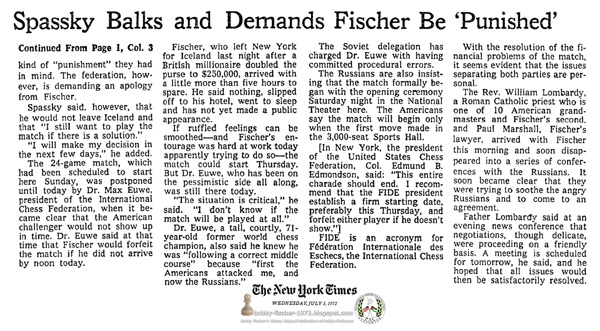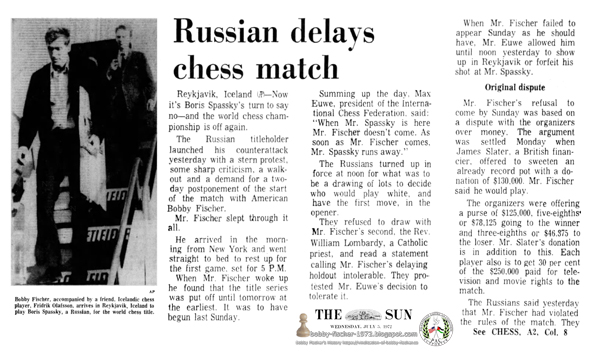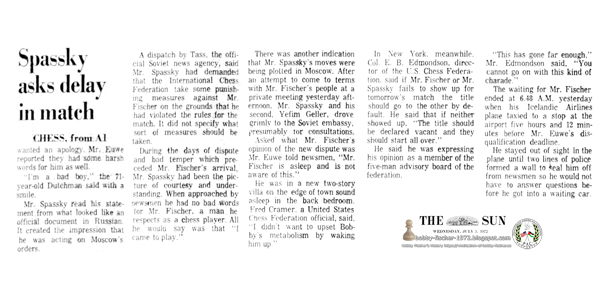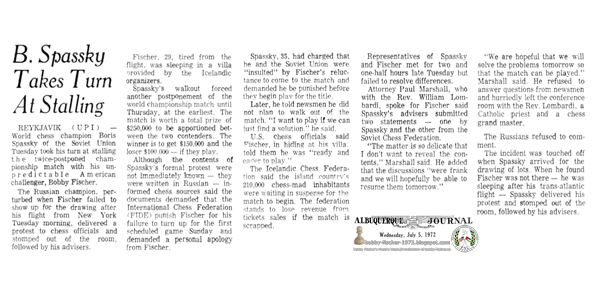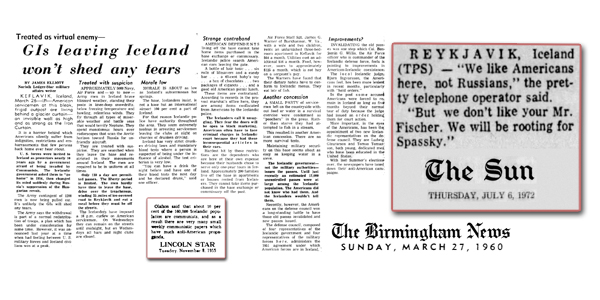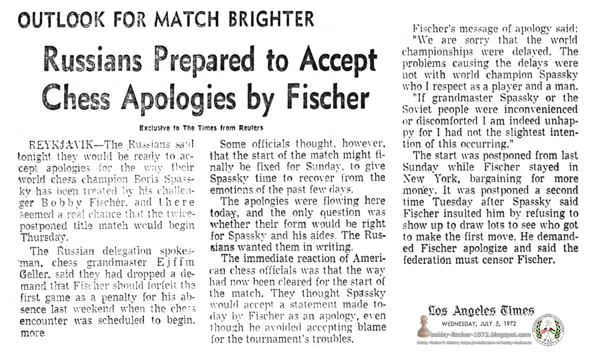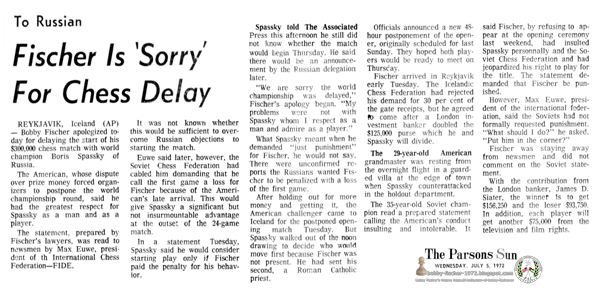New York Times, New York, New York, Wednesday, July 05, 1972 - Page 01, 34
Spassky, Refusing to Play, Asks Fischer Be ‘Punished’ by Harold C. Schonberg
Reykjavik, Iceland, July 4 — The world championship chess match, moved thousands of miles, postponed and then postponed again because of the protests of Bobby Fischer, was delayed once more today—this time because the Russian title-holder refused to play.
The champion, Boris Spassky, showed up at a meeting at which lots were to be drawn for the right to make the first move in the first game, which was to begin today. Fischer, who was said to be asleep in his hotel room, was represented by his second.
Instead of drawing lots, Spassky tossed down a statement and stalked out of the room. The statement, in a translation supplied by Tass, the Soviet press agency, said:
“Fischer broke the rules of holding the contest by refusing to come for the ceremony of opening the match. By this, Fischer insulted me, personally, and the Chess Federation of the U.S.S.R., which I represent.
“The public opinion in the U.S.S.R. and I, personally, are indignant over Fischer's conduct. Under all human notions, he discredited himself completely. By this he jeopardized his moral right to play in the match for the world chess crown.
“Fischer must bear the just punishment before there is a hope of holding the match. Only after this can I return to the question about the possibility of holding the match.”
Neither Spassky nor the Soviet Chess Federation made any specific suggestions about what kind of “punishment” they had in mind. The federation, however, is demanding an apology from Fischer.
Spassky said, however, that he would not leave Iceland and that “I still want to play the match if there is a solution.”
“I will make my decision in the next few days,” he added.
The 24-game match, which had been scheduled to start here Sunday, was postponed until today by Dr. Max Euwe, president of the International Chess Federation, when it became clear that the American challenger would not show up in time. Dr. Euwe said at that time that Fischer would forfeit the match if he did not arrive by noon today.
Fischer, who left New York for Iceland last night after a British millionaire doubled the purse to $250,000, arrived with a little more than five hours to spare. He said nothing, slipped off to his hotel, went to sleep and has not yet made a public appearance.
If ruffled feelings can be smoothed—and Fischer's entourage was hard at work today apparently trying to do so—the match could start Thursday. But Dr. Euwe, who has been on the pessimistic side all along, was still there today.
“The situation is critical,” he said. “I don't know if the match will be played at all.”
Dr. Euwe, a tall, courtly, 71-year-old former world chess champion, also said he knew he was “following a correct middle course” because “first the Americans attacked me, and now the Russians.”
The Soviet delegation has charged Dr. Euwe with having committed procedural errors.
The Russians are also insisting that the match formally began with the opening ceremony Saturday night in the National Theater here. The Americans say the match will begin only when the first move is made in the 3,000-seat Sports Hall.
[In New York, the president of the United States Chess Federation, Col. Edmund B. Edmondson, said: “This entire charade should end. I recommend that the FIDE president establish a firm starting date, preferably this Thursday, and forfeit either player if he doesn't show.”]
FIDE is an acronym for Federation Internationale des Eschecs, the International Chess Federation.
With the resolution of the financial problems of the match, it seems evident that the issues separating both parties are personal.
The Rev. William Lombardy, a Roman Catholic priest who is one of 10 American grandmasters and Fischer's second, and Paul Marshall, Fischer's lawyer, arrived with Fischer this morning and soon disappeared into a series of conferences with the Russians. It soon became clear that they were trying to soothe the angry Russians and to come to an agreement.
Father Lombardy said at an evening news conference that negotiations, though delicate, were proceeding on a friendly basis. A meeting is scheduled for tomorrow, he said, and he hoped that all issues would then be satisfactorily resolved.
Opinions Vary
Several grandmasters today, in discussing the Russian tactics, had varying opinions on the subject. One school of thought held that Spassky should have demanded a game tonight, while Fischer's biological clock was still adjusting to the change of time zone and lack of darkness. Others said Spassky was too angry to play his best game and should wait until he simmers down.
Spassky, these experts said, is more of an attacking player than the precise Fischer, and in his eagerness to punish the American might launch an unsound and s*icid*l attack.
Fischer has yet to see the hall where he and Spassky are supposed to meet. He may not like the lighting and in the past he has refused to play on this ground. He may not like the table. (A specially built chess table had to be hastily rebuilt a few days ago when it was discovered that it was too highly polished and created a glare).
His objections led the city of Belgrade, Yugoslavia, to withdraw its bid to be the site of the title match. His protests led to two postponements of the start. Today, while Fischer slept, Spassky protested.
(Caption) SPASSKY WALKS OUT: Boris Spassky, right, the champion, holding car door open for associates after leaving a meeting at which he and Fischer were to have drawn lots for the first move. But Fischer had sent a second.
New York Times, New York, New York Wednesday, July 05, 1972 - Page 34
Mover in Finance and Chess: James Derrick Slater by Bernard Weinraub
London, July 4—Promptly at 10 A.M. a chauffeur-driven Rolls-Royce glides to a halt at a building in the shadow of St. Paul's Cathedral. The car door opens and Jim Slater, a lean, dapper figure steps out quickly to move into a waiting elevator that takes him to his office round of phone calls—to bankers in Hong Kong, Industrialists in South Africa, investors in Australia and, to chess experts in London.
The London phone calls clearly pleased the 43-year-old investment banker. He was assured that Bobby Fischer had finally flown to Iceland for the world championship match against Boris Spassky—a move spurred by Mr. Slater's offer of $125,000 to double the chess purse.
“I'm very delighted that Fischer has accepted my financial offer and I hop that the match will now proceed,” the millionaire said in a statement this morning. “I'm sure it will be a very interesting and exciting championship.”
The subdued words were a sharp contrast to yesterday's comment to Bobby Fischer, who was demanding more money. Mr. Slater said simply: “Fischer has said that money is the problem. “Well, here it is—my message to Fischer is: ‘Come on out and play.’”
Mr. Slater declined to speak to newsmen today, but his associates, who said he would be “tied up all day in conferences,” made clear that the chess-playing investment banker and chairman of Slater Walker Securities was exultant.
This, of course, was before it became known that the much-delayed match had been postponed again, this time because of Spassky.
“He had been waiting for so long for the match to take place and was so disappointed when Fischer didn't show up,” one associate said of Mr. Slater. “When he heard it was because of money, well, he wanted to put Fischer behind the eight ball and prove this was the reason.”
Another associate said of him: “He's absorbed by chess, he loves it. It's an intellectual exercise with him. He very much wanted the match to take place because, he felt, it would give chess a certain status in the world of competitive sports.”
Need for Special Gesture
A friend of Mr. Slater, Leonard Barden, a former British chess champion and a writer who arranged the deal with Mr. Fischer, said:
“This is not a case of a businessman jumping on a well-publicized act. He thought the whole chess world would be disappointed and some special gesture was required. He's a very clear-headed, outgoing person, and if he weren't such a good businessman he'd be a very good professional chess player.”
Although Mr. Slater sometimes manages to fit in a game at lunchtime, and still plays chess by correspondence, his principal activity is, of course, finance. He is known in the City—London's Wall Street—as one of the most razzle-dazzle investment bankers of the last decade.
In eight years, Mr. Slater has turned a mere £2,000 (about $5,000) of savings into an investment banking complex that is valued today at £220-million or $550-million. His personal fortune is estimated at more than $6-million.
“Slater needs Europe, and Europe needs Slater,” The Observer, a Sunday newspaper, said recently. “There is no one on this side of the Channel who has a better grasp of how the Continentals should start restructuring their finance and industry if they are to get the most out of Britain's entry into the Common Market in 1973.”
Early Interest in Game
James Derrick Slater was born March 13, 1929 in the town of Wirral in Cheshire. His father, Hubert, was a local businessman. Young Slater attended state schools, and, by the age of 11, had played his first game of chess. The game fascinated him: As a youngster he played against J.A. Fuller, who became British boys' champion, and later drew against a former British champion, Sir George Thomas.
Only when he started studying accountancy at 16 did he put his set away. “The game was too time-consuming,” Mr. Slater said. (He started playing chess again five years ago, and he usually plays his wife, the former Helen Wyndam-Goodwyn.)
After qualifying as an accountant, Mr. Slater began his career as a secretary with an engineering firm. He was later named director of a truck manufacturing company that eventually became a subsidiary of Leyland Motors, the giant British automotive company.
Set Up Own Concern
Mr. Slater became deputy sales director and the associate of Lord Stokes, now the corporation's chairman. In 1964, with Peter Walker, now Minister for the Environment, Mr. Slater formed Slater Walker Securities, which controls more than 250 companies around the world, and has a large stake in mutual fund companies.
Mr. Slater is somewhat publicity-shy and has, in the past, avoided public hoopla. He and his wife live in a sprawling home in Surrey with their four children, ranging in age from 1 to 7.
Although his surprisingly brief listing in Who's Who mentions gold and table tennis as recreations, the first item listed in clearly the most important: chess.
The Baltimore Sun Baltimore, Maryland Wednesday, July 05, 1972 - Page 1
Russian Russian Delays Chess Match
Reykjavik, Iceland (AP)—Now it's Boris Spassky's turn to say no—and the world chess championship is off again.
The Russian titleholder launched his counterattack yesterday with a stern protest, some sharp criticism, a walkout and a demand for a two-day postponement of the start of the match with American Bobby Fischer.
Mr. Fischer slept through it all.
He arrived in the morning from New York and went straight to bed to rest up for the first game, set for 5 P.M.
When Mr. Fischer woke up he found that the title series was put off until tomorrow at the earliest. It was to have begun last Sunday.
Summing up the day, Max Euwe, president of the International Chess Federation, said: “When Mr. Spassky is here Mr. Fischer doesn't come. As soon as Mr. Fischer comes Mr. Spassky runs away.”
The Russians turned up in force at noon for what was to be a drawing of lots to decide who would play white, and have the first move, in the opener.
They refused to draw with Mr. Fischer's second, the Rev. William Lombardy, a Catholic priest, and read a statement calling Mr. Fischer's delaying holdout intolerable. They protested Mr. Euwe's decision to tolerate it.
When Mr. Fischer failed to appear Sunday as he should have, Mr. Euwe allowed him until noon yesterday to show up in Reykjavik or forfeit his shot at Mr. Spassky.
Original dispute
Mr. Fischer's refusal to come by Sunday was based on a dispute with the organizers over money. The argument was settled Monday when James Slater, a British financier, offered to sweeten an already record pot with a donation of $130,000. Mr. Fischer said he would play.
The organizers were offering a purse of $125,000, five-eighths or $78,125 going to the winner and three-eighths of $46,375 to the loser. Mr. Slater's donation is in addition to this. Each player also is to get 30 per cent of the $250,000 paid for television and movie rights to the match.
The Russians said yesterday that Mr. Fischer had violated the rules of the match. They wanted an apology. Mr. Euwe reported they had some harsh words for him as well.
“I'm a bad boy,” the 71-year-old Dutchman said with a smile.
Mr. Spassky read his statement from what looked like an official document in Russian. It created the impression that he was acting on Moscow's orders.
A dispatch by Tass, the official Soviet news agency, said Mr. Spassky had demanded that the International Chess Federation take some punishing measures against Mr. Fischer on the grounds that he had violated the rules for the match. It did not specify what sort of measures should be taken.
During the days of dispute and bad temper which preceded Mr. Fischer's arrival, Mr. Spassky had been the picture of courtesy and understanding. When approached by newsmen he had no bad words for Mr. Fischer, a man he respects as a chess player. All he would say was that “I came to play.”
There was another indication that Mr. Spassky's moves were being plotted from Moscow. After an attempt to come to terms with Mr. Fischer's people at a private meeting yesterday afternoon, Mr. Spassky and his second, Yefim Geller, drove grimly to the Soviet embassy, presumably for consultations.
Asked what Mr. Fischer's opinion of the new dispute was Mr. Euwe told newsmen, “Mr. Fischer is asleep and is not aware of this.”
He was in a new two-story villa on the edge of town sound asleep in the back bedroom. Fred Cramer, a United States Chess Federation official, said, “I didn't want to upset Bobby's metabolism by waking him up.”
In New York, meanwhile, Col. E.B. Edmondson, director of the U.S. Chess Federation, said if Mr. Fischer or Mr. Spassky fails to show up for tomorrow's match the title should go to the other by default. He said that if neither showed up, “The title should be declared vacant and they should start all over.”
He said he was expressing his opinion as a member of the five-man advisory board of the federation.
“This has gone far enough,” Mr. Edmondson said. “You cannot go on with this kind of charade.”
The waiting for Mr. Fischer ended at 6:48 A.M. yesterday when his Icelandic Airlines plane taxied to a stop at the airport five hours and 12 minutes before Mr. Euwe's disqualification deadline.
He stayed out of sight in the plane until two lines of police formed a wall to seal him off from newsmen so he would not have to answer questions before he got into a waiting car.
Caption: Bobby Fischer, accompanied by a friend, Icelandic chess player, Fridrik Olafsson, arrives in Reykjavik, Iceland to play Boris Spassky, a Russian, for the world chess title.
The Boston Globe Boston, Massachusetts Tuesday, July 04, 1972 - Page 1
([Wrong Mr. Dondis. Soviet are making these decisions from Moscow. Mr. Spassky is simply following orders. The Soviet was throwing temper tantrums all along. The press simply chose to ignore them.])
It's Spassky's Turn for Temper by Harold Dondis, Globe Correspondent
Reykjavik, Iceland — The most eagerly awaited confrontation since Muhammad Ali and Joe Frazier is still just that — eagerly awaited — as a tumultuous day in Iceland ended with Russian chess champion Boris Spassky throwing a temper tantrum of his own.
Consequently, the Chess Match of the century will start no sooner than tomorrow, if it ever starts at all.
Bobby Fischer, American one-time boy wonder, showed up here yesterday, just in time for Spassky to refuse to play until Fischer is punished for delaying the match.
“What am I supposed to do” asked International Chess Federation President, Dr. Max Euwe, “put him in the corner?”
As most people are aware by now, the match for the world chess championship, a Russian preserve for many years, was to have begun on Sunday. But Fischer, in the finest recent tradition of American athletes, held out for more money and refused to show up.
Enter a British millionaire, one Jim Slater, who kicked in additional money, raising the prize money to $150,000 to the winner and $100,000 to the loser. This apparently met with Fischer's approval, for he ended his holdout and flew to Iceland.
Then it was Spassky's turn. Claiming he was insulted by Fischer's action (after all, he is the champion, and is there really such a thing as a drawing card in chess?), he and a contingent of representatives protested via a formal complaint issued to Dr. Euwe.
The situation is this: Before the first pawn is moved, Spassky must be assuaged for his hurt feelings, Fischer must be satisfied as to the playing conditions and they must draw for piece colors (white gets to move first, and there are those who say Fischer cannot be beaten when he has white.)
Meanwhile, an official two day extension has been granted before the first of 24 matches will be played. That leaves plenty of time for additional psychological warfare, which many experts say is all this whole thing is about, anyway.
The Tampa Tribune Tampa, Florida Wednesday, July 05, 1972 - Page 41
Paul Morphy: Brilliant Master
UPI — Bobby Fischer has said that the chess player he admires most is Paul Morphy, whose short but brilliant career in the mid-18th century made him the first and only American ever recognized as world champion.
While Fischer's precocious ability on the board has stunned the chess world, Morphy's feats, though less well known, were even more imposing.
Born in New Orleans, in 1837, Morphy was taught the game by his father and when he was 12 years old defeated the Hungarian J. Lowenthal, then recognized as one of the world's best. Fischer was 14 years old when he won the United States championship.
At 22, Morphy traveled to Europe, defeating there a series of International Grand Masters, and was generally recognized as the world's best played in 1858-59. Fischer will be a 29-year-old world champion if he defeats Spassky.
Morphy's prowess was such that he would on occasion play blindfolded against eight strong players simultaneously, each time with great success.
But after returning to the U.S. in 1859, Morphy gradually lost interest in the game and stopped playing in public, altogether by 1866 ([with exception to games played with personal friends at his residence, right up to the date of his death, reportedly, continued his tradition of offering knight odds to comers.]) He died of a brain hemorrhage in 1884 ([under mysterious circumstances, which were never subjected to a proper post-mortem, to make a proper determination on cause of death. Though the papers misled readers to believe an autopsy had been performed, and at such a relatively young age. His untimely demise followed years of defamatory, unwarranted harassment in public newspapers. A contemporary New Orleans editor confirmed the origin of such rumors, were coming from “Northern Newspapers.” Union fanatics. — Morphy was the unfortunate gentleman, caught in the flack of the fanatical element of the Union, post-Civil War. That's precisely why he retreated to New Orleans and retired from public. Threats from within New York/Washington Chess circles. Northern colleagues decided to “retire” Morphy against his will. Not unlike when Northern states, led by George Bush chose to persecute Fischer, with full force of the U.S. Justice Department, while looking the other way, from the multi-million dollar white collar crimes taking place under their nose. Back in Morphy's day, Sherman was turning West, to kill all the buffalo and enslave what remained of the Native American Indians (Wounded Knee, December 29, 1890), confining survivors to “Reservation” camps. Criminalizing chess players make an effective distraction from federal crimes in mass media. Really ignites the passions of the “patriotic” underbelly to a feverish pitch.)]
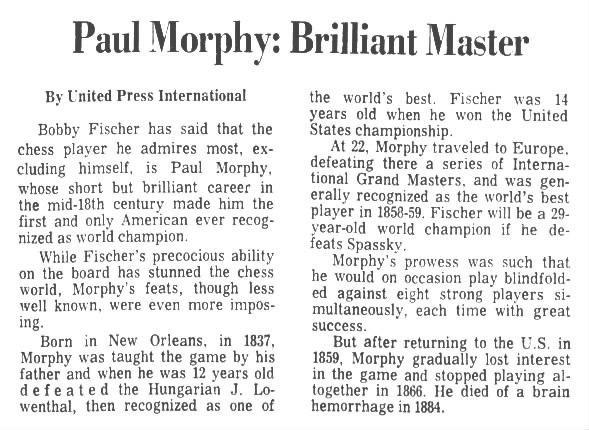 Paul Morphy: Brilliant Master 05 Jul 1972, Wed The Tampa Tribune (Tampa, Florida) Newspapers.com
Paul Morphy: Brilliant Master 05 Jul 1972, Wed The Tampa Tribune (Tampa, Florida) Newspapers.com
The Tampa Tribune Tampa, Florida Wednesday, July 05, 1972 - Page 41
Boris Vasilevich Spassky: A Cool World Champion
(UPI) Boyish Boris Spassky stays cool when those around him sweat and squirm.
He sits on a Moscow stage under boiling klieg lights, surrounded by a hundred newsmen. His future is at stake. A determined man wants his job. In a soft and nonchalant voice, he says:
“I do not know who will win, but I am sure it will be an interesting and important event.”
Boris Vasilevich Spassky, 35, of Leningrad, Russia, is the world champion at the game of chess.
HE COULD NOT be more unlike America's Bobby Fischer, the cocky and controversial chess genius who is challenging for Spassky's title and boasting he will win.
Spassky, who defeated fellow Soviet player Tigran Petrosyan for the world title in 1969, looks more like a 25-year-old track and field star than a 35-year-old chess champion. He sounds more like the nice boy next door than a celebrity.
Slender and broad shouldered, without an ounce of fat, Spassky can be recognized in a crowd by his thick brown way hair and his almost baby face. The soft facial effect is sharpened by a prominent beak of a nose and ice blue eyes that never seem to blink.
THE CHAMPION is soft spoken, courteous, modest and unassuming in the extreme.
Once at the chess board, however, Mr. Nice Guy disappears.
Like Fischer, Spassky is an aggressive, attacking, chess player although generally rated not quite as quick and a bit more profound in style. Spassky demolished defensive master Petrosyan for the title three years ago, beating him in only 24 moves in one game with his “hurricane attack.”
Spassky was born in Leningrad in 1937 and took a degree in journalism, although he is strictly a professional chess player.
He began playing chess at age nine, became an international master at age 16 and World Junior Champion at age 18 in 1955. He first challenged Petrosyan for the world title in 1966 and lost.
WHILE HE HAS a gentle and charming personality in public, Spassky represents a chess juggernaut that pours every resource into its gifted players and protects them from public scrutiny in typical Soviet style.
Little, therefore, is known about his private life or preparations for this match.
It is known, however, that like all Soviet chess players he preps with heavy athletic training as well as mental tuning. He was a track athlete as a young man and likes swimming now.
Spassky lives in a three-room Moscow apartment with his second wife, Larissa, a refrigerator engineer, and their son Vasily, who became five years old Sunday.
He also has a 12-year-old daughter, Tatiana, by a previous marriage.
Robert J.(Bobby) Fischer A Cocky U.S. Challenger
UPI — Possibly what most worries the man-on-the-street in Moscow these days is a chess player from Brooklyn, N.Y., named Robert James Fischer.
For a Russian, the thought that Fischer could defeat their champion is something akin to what an American would feel at the idea that nine Soviets could whip the Pittsburgh Pirates in four straight.
THE OBJECT of the Russians' concern is still called “Bobby” though he is now 29 years old.
Fischer was born in Chicago March 9, 1943, but raised in Brooklyn, N.Y., where his family moved when he was two years old.
His sister taught Bobby the fundamentals of chess when he was six. With the help of a neighbor interested in the game and his own remarkable powers of memory and concentration, Fischer became United States champion at the age of 14.
Since then, the 64 black and white squares of the chess board and the desire to prove himself unequaled in his mastery of them, have become Fischer's obsession.
Fischer has won an unprecedented string of victories in the past two years, the last over the Armenian master of defensive chess, Tigran Petrosian, to earn the right to face Spassky, who had earlier defeated Petrosian to win the world title.
WITH AN unsurpassed memory and encyclopedic knowledge of the game, Fischer is a great positional player and ferocious attacker. But his complaints about flashbulbs, noise, living conditions and spectator movement have been known to drive tournament directors wild.
American experts are confident of a Fischer victory, although Spassky has won three games and drawn two in their previous encounters. Characteristically, Fischer agrees.
Once asked who he thought was the greatest player in the world, Fischer replied “It would be nice to be modest but it would be st*p*d if I did not tell the truth. It is Fischer.”
Kenosha News Kenosha, Wisconsin Wednesday, July 05, 1972 - Page 1
Bobby Fischer Apologizes but Chess Ruckus Continues
Reykjavik, Iceland (UPI)—American chess challenger Bobby Fischer apologized today for delaying the start of the world championship match with Russian Boris Spassky but a demand from the Soviet chess federation threatened to cancel the 24-game series.
The Russian chess group cabled Dr. Max Euwe, president of the International Chess Federation (FIDE), demanding that Fischer be ordered to forfeit the first game because he did not abide by an agreement which said both players must show up within one hour of the scheduled game time.
“If the Russians insist on this penalty I believe the whole match is off,” said Euwe.
“We are sorry that the world championships were delayed. The problems causing the delays were not with world champion Spassky who I respect as a player and a man,” Fischer said.
“If grandmaster Spassky or the Soviet people were inconvenienced or discomforted I am indeed unhappy for I had not the slightest intention of this occurring,” Fischer said.
Officials hoped the twice-postponed tournament could get under way Thursday but earlier representatives of both Fischer and Spassky broke off talks, casting doubts on the possibility the match would be held.
Fischer, who has remained in seclusion since arriving in Reykjavik early Tuesday, apologized in a statement read by his second, the Rev. William Lombardy.
“The Russians said today they don't want any further talks with the Americans,” Euwe said.
The talks between representatives of Fischer and Spassky started Tuesday after Spassky triggered the second postponement of the scheduled 24-game series, saying Fischer had insulted him by not showing up for pre-match ceremonies. He said he would not play until FIDE punished Fischer and Fischer personally apologized.
Officials hoped the match could start Thursday.
Earlier, the official Soviet News Agency Tass criticized Fischer and said he and his backers planned to use a computer to try to win Spassky's title.
The 24-game championship match was scheduled to start Sunday, but Fischer, a 29-year-old chess genius from Brooklyn, failed to turn up, mostly because he wanted more money than the $125,000 purse put up by the organizers.
All appeared saved when a British millionaire banker—and chess fan—dug into his own pocket to offer another $125,000. Fischer was on the next plane to Reykjavik and arrived Tuesday morning, where he quickly left the airport not to be seen since.
Cam the draw Tuesday to see who would play white for the first game and Fischer was asleep. So he sent his second, while Spassky was there in person. The world champion, 35, ([they actually mean the Soviet Regime Apparatus]) apparently decided he had had enough of Fischer's antics ([or anyone who pose a risk to the Soviets of losing a title outside the USSR, including punishing their own athletes)] and issued a statement that said:
“Fischer broke the rules of holding the contest by refusing to come for the ceremony of opening the match. By this, Fischer insulted me, personally, and the Chess Federation of the U.S.S.R., which I represent.”
He added that since Fischer had broken the rules he “must bear the just punishment before there is a hope of holding the match. Only after this can I return to the question about the possibility of holding the match.”
[★]He also demanded a personal apology.
Fischer's lawyer, Paul Marshal, and his second, Father William Lombardy, were optimistic.
“We are hopeful we will be able to solve our differences with the Russians,” said Marshall after a 2½-hour session with Spassky's advisors Tuesday night.
Marshall said he and Father Lombardy, a burly Catholic priest and international chess grand master, will sit down again with the Russians today to try to solve the problems.
“We are making progress,” Father Lombardy said.
Dr. Max Euwe, president of the international federation said he hoped to be able to stage the first game Thursday.
Euwe said, “Bobby sides say they want to play so I believe they will find some solution. It would be a great setback for world chess if we would have to call off the match.”
Daily News New York, New York Wednesday, July 05, 1972 - Page 122
Bobby's Acquaintances Repeat Soviet Propaganda Because They Don't Know Enough, To Know the Difference by Dave Hirshey and William McFadden
Bobby Fischer, the chess grandmaster, is in danger of losing ([very few, a minority, Americans loved Bobby, the others, were already dangling from Soviet propaganda arm]) many of whom deplore his tactics ([they deplore his aggressive stylistic approach to life, on and off the chessboard? They don't appreciate how greatness operates. Can't have one without the other. That is why Bobby became a national sensation, a celebrity and they are… well, merely, acquainted with him]) in the current brouhaha in Iceland.
But Fischer is still revered as the most masterful chess player the world has ever produced.
That was some of the reaction that boiled up around town yesterday as Bobby waited, in Iceland at last, for his world championship match to begin with Russia's Boris Spassky.
Said Peter Stevens, a crack amateur who plays at the Marshall Chess Club, one of the major chess centers in the city:
“Bobby is a very lucky guy. ([LUCK had nothing to do with it.]) If it had not been for the millionaire Englishman and his pot-sweetener, I'm sure Bobby would just have painted himself out of the championship match. ([For organizers to do what? Announce Fischer is being replaced with Petrosian, for another Russian-Vs-Soviet showdown... and while crowds turn away with loss of interest, and landslide loss of revenue, even the Russian people had grown tired of the same ole . . . Bobby KNEW those organizers were eager to make a hefty profit, and it was not possible without the one and only, Robert James Fischer. Fischer checkmated the whole system of USSR and their Organizers with his boycott, proving once and for all, they NEEDED him — but he didn't need them. He confirmed this, verbally, in his answer to Johnny Carson, November 1972. The World Title was NOT that important to him, because he already knew, and absolutely confident that he was already the world's best … but the Soviets chose for years to downplay his skill in the press, waging a war of Ad Hominems compelling him to go all the way for the world title. The world tournament was a mere formality to establish Fischer officially as the world's #1.])
“Bobby's a first-class player—and a second-class extortionist. ([How figured? The chess world was checkmated into practically begging Fischer on bended knee to appear in Reykjavik, because Bobby would have them to PROVE his worth. If it had been anyone else, they'd dismissed them and replaced with Petrosian and nobody would've cared. But the chess world wanted to see FISCHER meet the world challenge. Not Petrosian. Not another Soviet…]) His lawyers will probably sue me for saying that. You'll have to cover the trial.”
Two chess masters also aired their views at the Marshall club—and all they could agree on was that Bobby is a chess genius.
Jeffrey Kastner, whose rating is 2283 (.400 in baseball), smoldered:
“I think he's very unethical after all the trouble Iceland went to to set up the match. ([Oh, he means, all the trouble the Soviet Machinery went to, to squeeze Australia and Argentina and Mexico out of the bid when Belgrade made its illegal $35,000 “guarantee” demand, and then withdrew and Max Euwe put out the announcement, “First come first serve basis for bidding,” and the Soviets twisted Euwe's arm into forcing the entire match held in Iceland. Organizers even admitted, if the match wasn't played in Reykjavik, they wouldn't have much to lose, so to say otherwise, is an exaggeration.]) I think Bobby's a cad ([and certainly thinks the flawless Soviets and their maneuvering is without blemish]) And he is giving the United States, and chess, a bad name.” ([Most people didn't give a second look at chess, until Fischer so what is this guy talking about? Secondly, the United States Federal Government was where the majority of information was generated and poured into Western Media, which was fueling Fischer's distrust of the Soviet Union … so come again? The U.S. Government didn't need Fischer to give itself a “bad reputation” with the Soviet Union. Fischer was acting upon the environment he was shaped in, and according to the scathing ridicule unleashed by Soviet press. Moving along to better qualified opinions…])
Brian Hulse (rating: 2202) thought that Bobby's money battle was just a legitimate pre-match ploy.
“Bobby hasn't lost any of his followers as a chess player. He's still tops. It's only those celebrity hangers-on that are drifting away. And they'll be back after he wins the title.
“What I think is that Bobby just took a preopening gambit as a psyche try on Spassky. Psychology is very important in chess. And, in a long match, as this one is, it might work.”
Chess expert Charles Welden agreed: “I like him. I don't agree with everything. But I feel he has a right to do what he has. It might just work.”
Over in Greenwich Village's Washington Square—the kind of little park where Bobby, then a sneaker-wearing 14-year-old prodigy from Erasmus High School, used to play 15 years ago—the reaction was more anti-Bobby.
“If we wanted to see a show,” said a man in his 50s, removing his shirt but not his yellow tennis hat, “we could go to the theater.
“I remember Bobby as a young boy, beating all the masters. I used to pull for him. But now I think he stinks. All he wants is money. It's a d**** shame.” ([He read one too many of those vitriolic Soviet tainted news reports. No mention of how Belgrade illegally demanded a $35,000 guarantee and falsely accused in a pseudo-chess publication Fischer of sending cablegrams, which Robert Byrne reviewed and could only come away with “allegedly said,” and “quoted as saying,” when USCF President confirmed that Belgrade and Reykjavik were altogether REFUSING to sit down and talk with Fischer. Where was Fischer? In training, and silent. Minding his own business while over in Europe everything was going over the deep-end. But our commentator doesn't seem to have all his facts together and sorted out in his head.])
And Doug Price, a Brooklyn teacher who describes himself as a chess nut, said:
“It reminds me of the Ali-Frazier fight. I think Fischer may have psyched himself out with all his boasting and predicting an easy victory. If he hasn't, then I think he'll win even though I don't agree with his tactics. ([If it were baseball players, postponing the season for a better contract, they'd fully understand. Because this is America … and chess.]) He signed an agreement ([oh no he didn't and even Euwe acknowledged this]) and then he reneged. ([No, even Euwe acknowledged there was no signed contract, Fischer merely had the USCF relay Fischer stated he would play, “under protest.”.]) It's no different than breaking a contract.” ([Since the commentator didn't have all his facts together, it accounts for his bias. Fischer kept his end of the agreement, that he would play in Reykjavik, “under protest.” if this man had actually known, as much as he thought he did, had he not been misled by Soviet rumors circulated in American papers, he'd known what Euwe was reported as saying many times over. Fischer agreed he would play, “under protest.” so Fischer broke no obligatory contract. Especially not one that was signed on a dotted line.)]
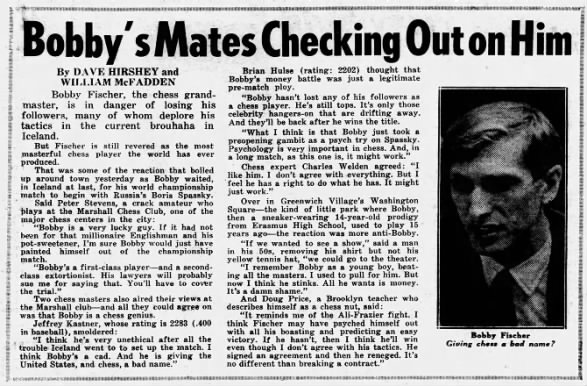 Soviet Political Propaganda / Smear Campaign 05 Jul 1972, Wed Daily News (New York, New York) Newspapers.com
Soviet Political Propaganda / Smear Campaign 05 Jul 1972, Wed Daily News (New York, New York) Newspapers.com
The Herald Statesman Yonkers, New York Wednesday, July 05, 1972 - Page 3
Hartsdale Chess Master Sees Personality Dispute in Iceland by Lee Richards III
Hartsdale — “I've known Bobby Fischer since he was in knee-pants, but what I can't be sure of is what he feels about the chess championship at this moment.”
On what was supposed to be the even of the long-awaited Boris Spassky-Bobby Fischer world chess championship match, Arthur Bisguier, former U.S. chess champion, sat in the small study of his Hartsdale home, puzzling over the mystery of Fischer and the patient confidence of Spassky.
The championship, which was to begin in Reykjavik, Iceland this past weekend, was postponed on Fischer's request by International Chess Federation president Max Euwe.
DESCRIBING CHESS as “a battle of personalities and character quite as much as a battle of ability.” Bisguier said that by not showing up on time and openly making comments about Spassky, Fischer was “playing games.”
The outcome of the match will depend on whether Fischer can shed the “monkey sign” Spassky has placed over him, according to Bisguier.
The two have met over the chess board five times previously, and despite his perfect lifetime match record, Fischer has yet to beat the Russian. They've “drawn” (tied) three times and Spassky has won twice.
National chess champ from 1954 to 1957, just before the triumph of young Fischer, Bisguier has played and beaten both Fischer and Spassky.
WEIGHING their present chances against each other, Bisguier leaned back in his modern black leather chair under shelves and shelves of chess books and shrugged equivocally.
“Our chess rating system will tell you Fischer is the greatest chess player that ever lived, and I'm inclined to agree,” Bisguier remarked. “But Bobby's got to be thinking that he's not beaten this player yet. It's not necessarily the best chess player who wins.”
Las Vegas oddsmaker Jimmy the Greek has put the match at 10 to 7 for the U.S. Fischer, Bisguier rates Spassky higher, both as a player and a friend.
“I like Bobby. My wife is one of the few people I ever remember his being polite to,” the former champion commented. “It's just that he never grew up. His sense of values is different from the rest of us.”
BISGUIER CALLED Fischer's personality “mercurial” and “beguiling,” a “paradoxical combination of naïveté and experience.”
Always playing to win, even in games that appear to be clinched. Fischer's temperament, his “pure idealism,” bars him from letting up the way all other chess players do from time to time, according to Bisguier.
In order to save their mental strength, most players, he said, will lose a game they don't need or offer a draw to an opponent they don't need to beat.
“Fischer doesn't understand all these things,” Bisguier observed. “When I first lost to Fischer, the European players said, ‘Arthur, how can you let this kid do that to you?’ Later on he did it to them.”
PARAPHRASING another American chess grandmaster, Larry Evans, Bisguier described Spassky as the “lazy Russian bear.”
“If Spassky can start out well, Bobby's in trouble,” the Hartsdale chess master explained. “Boris is tough and mature, but very outspoken for a Russian; he's privately critical of his government though he's the last defender of the Russian faith. He's a Russian, not a Communist.”
For the last 25 years the Russians have dominated the chess world, but never produced a player like Spassky, who single-handedly overshadowed the rest.
BISGUIER remembered meeting Spassky, whom he considers a close personal friend, just after Spassky and his wife were divorced.
“I asked him what happened and he replied, ‘We got along like bishops of opposite color.’”
Bisguier, who will deliver a lecture on the personalities of Fischer and Spassky at the Mamaroneck Free Library at 2 p.m. July 16, insisted that he had no favorite, but at one point he did admit that “it's like Bobby's the heavy and Boris is the nice guy.”
The Pensacola News Pensacola, Florida Wednesday, July 05, 1972 - Page 2
 Keeping Track of the Moves 05 Jul 1972, Wed The Pensacola News (Pensacola, Florida) Newspapers.com
Keeping Track of the Moves 05 Jul 1972, Wed The Pensacola News (Pensacola, Florida) Newspapers.com
Keeping Track of the Moves by Fred Brown
HAVE YOU been keeping track of the moves in the world chess championship which was to have begun Sunday?
It's been a riot so far.
First, the American Bobby Fischer (sometimes known as the enfant terrible), says there wasn't enough money in Reykjavik, Iceland, whatever that might be, to force his presence. A measly $125,000 record pot wasn't enough for our boy.
Then the present world champ, Boris Spassky got tired of the challenger's challenges and walked out. ([Actually, that's the childish, immature Soviet Chess delegates ordering Spassky to obey their scripted-in-Moscow “stunt”]).
SOMEBODY SHOULD give the fellows a pair of leather gloves instead of knights, kings and queens.
Chess is a war of nerves and intellect, but this is getting ridiculous. The chess world awaits the match of the century and both boys are acting like a couple of teenagers ([Fischer was on the Autism Spectrum, whilst the Soviet Federation, consisting of supposedly mature adults have no excuse]) before the big prom.
Fischer, the U.S.'s only hope of claiming a world title, asked for more money (30 per cent of the gate) and got it from a Britain benefactor, who evidently is a chess buff or a fellow who likes to see a good scrap.
From the outset, Fischer has been playing heavily on the war of nerves. He said all along he wanted more money and several countries refused to meet his demands. ([On the contrary! Many nations offered MUCH higher bids, because Fischer was in high demand, the highest was Australia coming in at a heavy $225,000 -- with 200k of that going for prize money, whilst 25k reserved for organizational expenses. Mexico -- $175k, Argentina a debated figure of $150k, et al, but the Soviet didn't want such sweet incentives to entice non-Soviet federation players into competition, making it possible for somebody other than a Soviet, to successfully challenge for the world title. And, by Fischer demanding more cash prize, he succeeded in breaking one of the links enabling the Soviet monopoly.])
THE RUSSIAN, backed by Moscow as are all Russian chess players (it's their national sport), said he was ready to play.
But, the pressure is on Spassky. He is the world king. He must win. Russia has never lost a world championship. And to do so now would be a slap in the face. Especially to Fischer, who says he is simply the greatest of them all.
Fischer is sort of a Cassius Clay (Muhammad Ali) of the chess world.
Spassky no doubt feels the pressure and all this bantering back and forth has got to work on him further. But, just as in other sports, you don't get to be world champ by sitting in a corner on a stool taking the count.
NOW THAT Fischer's money demands have been met, it is time to get on with the work at hand — the 24-game championship.
The Soviets have filed their protest and everything is in order on the face front. It is time to see who actually is the world champ.
Any further deal would resemble a couple of baseball players refusing to play in a world series because their pay check wasn't enough.
Fischer, the chess phenom, has been criticized for his actions. But he alone has taken the game out of the realm of dusty obscurity and made it into something across sports pages in this country.
AND HE alone can bring the title to the U.S.
Now, it is the Russian's turn to move. And watch out for that first checkmate. It could be a nasty one.
The Boston Globe Boston, Massachusetts Wednesday, July 05, 1972 - Page 51
Fischer Apologizes, But . . . Spassky's Turn to Stall
Reykjavik, Iceland — American challenger Bobby Fischer issued a qualified apology today for his late arrival here to play Russian Boris Spassky for the world chess title — but there was no immediate sign that it would break the deadlock holding up the start of play.
The long-awaited 24-game series was due to start yesterday but the opening game was postponed when the Soviet titleholder refused to play, saying that Fischer's arrival two days after the opening ceremony was an insult for which the unpredictable American should be punished.
Spassky today restated this position in a revised version of his previous comments read to the press by Dr. Max Euwe, Dutch president of the world Chess Federation.
He said that Fischer “must take a just punishment” and that “only after that will I consider the possibility of playing the match.”
Fischer, he said, had violated the rules of common behavior, insulted him and the Russian people, and fully discredited himself.
Euwe said that before deciding how to act, the federation would like to know exactly what kind of punishment the Soviet aide wanted to impose on the challenger. ([Excessively juvenile Soviet antics, spiteful. “Sour Grapes” they know Fischer will win, so they will seek every opportunity to disgrace the challenger who was correct to boycott their troublesome meddling throughout January 1972 up to the start of the match, and they whine over Fischer's delay of two days.])
A statement by Fischer was then read to the press conference by his second, Rev. William Lombardy, in which he said he was sorry the championship had been delayed but did not concede any responsibility for the holdup.
Fischer said: “We are sorry that the world championship was delayed. The problems causing delays were not with the world champion Spassky, whom I respect and admire as a man and a player.
“If grandmaster Spassky or the Soviet people were inconvenienced or discomfited I am indeed unhappy for I had not the slightest intention of these occurrences.”
Fr. Lombardy added that the 29-year-old American was now anxious to proceed with the championship and wanted to present a copy of his message to Spassky when the lots were drawn for who played white in the opening game.
Euwe has expressed the hope that the series can get under way tomorrow. But today he indicated that the matter was now very much in the hands of the Soviets. ([Who will drain every drop of opportunity from this bad situation, aiming for the opportunity to make them much worse.])
Spassky told an Icelandic Radio interviewer before the press conference given by Euwe that the situation was “now very difficult” but that he had no plans to leave Iceland at the moment.
There was speculation here today that the Russians may settle for Fischer being reprimanded by the world Federation rather than formally disciplined through a fine or some form of suspension after the contest.
Fr. Lombardy said he doubted if anything financial would be involved in such a measure.
Fischer himself, staying well away from the hubbub of publicity in a rented luxury villa, emerged early today to be driven around in a police car to look at the championship facilities. Fred Kramer, president of the American Chess Federation, told reporters.
Fischer had not been inside the exhibition hall where the match was to be played, he added. “I looked (the facilities) over for him but I'm authorized to complain, not to approve.”
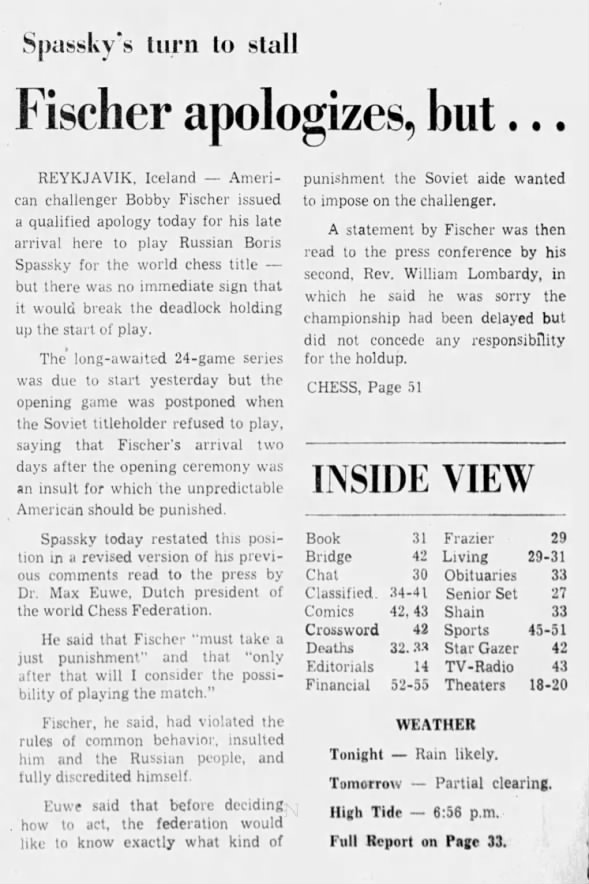 Fischer Apologizes, But . . . 05 Jul 1972, Wed The Boston Globe (Boston, Massachusetts) Newspapers.com
Fischer Apologizes, But . . . 05 Jul 1972, Wed The Boston Globe (Boston, Massachusetts) Newspapers.com
Kingsport Times Kingsport, Tennessee Wednesday, July 05, 1972 - Page 14
Russians Walk Out, Chess Championship May Be Off
Reykjavik, Iceland (UPI) — The Russians broke off their talks with representatives of American chess challenger Bobby Fischer today, throwing serious doubts on the possibility the twice-postponed world championship match with the USSR's Boris Spassky would ever be held.
“This is a very bad development and I am now very pessimistic about the match,” said Max Euwe, president of the International Chess Federation (FIDE).
The reason for the breakup was not immediately disclosed but representatives of Spassky, the reigning world chess champion, said they would explain later at a news conference.
“The Russians said today they don't want any further talks with the Americans,” Euwe said.
The talks between representatives of Fischer and Spassky started Tuesday after Spassky triggered the second postponement of the scheduled 24-game series, saying Fischer had insulted him by not showing up for the pre-match ceremonies. He said he would not play until FIDE punished Fischer and Fischer personally apologized.
Officials hoped the match could start Thursday.
Earlier, the official Soviet News Agency Tass criticized Fischer and said he and his backers planned to use a computer to try to win Spassky's title. ([Who makes such wild tall tales up? Pity upon the poor Russian who dare questions the absurd tall tales of the Soviet machinery.])
All appeared saved when a British millionaire banker—and chess fan—dug into his own pocket to offer another $125,000. Fischer was on the next plane to Reykjavik and arrived Tuesday morning, where he quickly left the airport not to be seen since.
Came the draw Tuesday, to see who would play white for the first game and Fischer was asleep. SO he sent his second, while Spassky was there in person. The world champion, 35, apparently decided he had had enough of Fischer's antics, and issued a statement that said:
“Fischer broke the rules of holding the contest by refusing to come for the ceremony of opening the match. By this, Fischer insulted me, personally, and the Chess Federation of the U.S.S.R., which I represent.”
He added that since Fischer had broken the rules he “must bear the just punishment before there is a hope of holding the match. Only after this can I return to the question about the possibility of holding the match.”
He also demanded a personal apology.
“I cannot see Bobby apologizing,” said Fred Cramer of the U.S. Chess Federation.
But Fischer's lawyer, Paul Marshall, and his second, Father William Lombardy, were more optimistic.
“We are hopeful we will be able to solve our differences with the Russians,” ([Good luck with that, because to solve differences with the Soviet Regime, is an impossibly futile endeavor]) said Marshall after a 2½ hour session with Spassky's advisers Tuesday night.
Marshall said he and Father Lombardy, a burly Catholic priest and international chess grand master, will sit down again with the Russians today to try to solve the problems.
“We are making progress,” Father Lombardy said.
Spassky told newsmen he did not plan to walk out of the match.
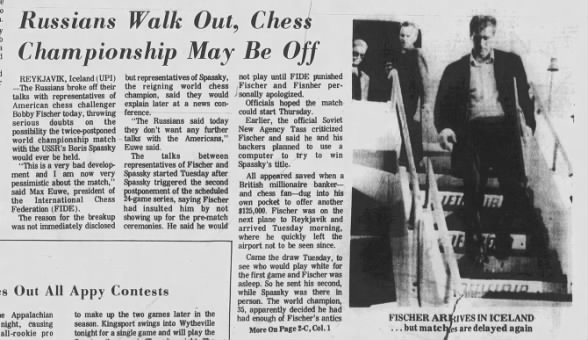 Russians Walk Out, Chess Championship May Be Off 05 Jul 1972, Wed Kingsport Times (Kingsport, Tennessee) Newspapers.com
Russians Walk Out, Chess Championship May Be Off 05 Jul 1972, Wed Kingsport Times (Kingsport, Tennessee) Newspapers.com
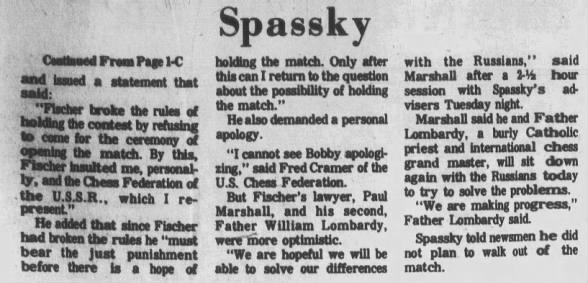 Spassky 05 Jul 1972, Wed Kingsport Times (Kingsport, Tennessee) Newspapers.com
Spassky 05 Jul 1972, Wed Kingsport Times (Kingsport, Tennessee) Newspapers.com
The Orlando Sentinel Orlando, Florida Wednesday, July 05, 1972 - Page 10
Spassky Turns Tables, Demands Punishment
Reykjavik, Iceland (UPI) Russian chess champion Boris Spassky stalked out of a meeting Tuesday, charging he and the Soviet Union had been insulted by Bobby Fischer and demanding the American challenger be punished before they play for the world title. ([And who will “punish” the Soviet Union for months and years of meddling, maneuvering off the chessboard, disruption of many, many chess tournaments through false and misleading published reports and misrepresentations of players in the press? Arm twisting, to gain personal advantage, to monopolize a large cross-section of sports titles?])
Spassky's walkout forced another postponement of the world championship match until Thursday, at the earliest. The match is worth a total prize of $250,000 to be apportioned between the two contenders. The winner is to get $150,000 and the loser $100,000.
REPRESENTATIVES OF Spassky and Fischer met for two and one-half hours late Tuesday but failed to resolve differences.
Attorney Paul Marshall, who with the Rev. William Lombardy spoke for Fischer, said Spassky's advisers submitted two statements — one by Spassky and the other from the Soviet chess federation.
“The matter is so delicate that I don't want to reveal the contents,” Marshall said. He added that the discussions “were frank and we will hopefully be able to resume them tomorrow.”
“WE ARE HOPEFUL that we will solve the problems tomorrow so the match can be played,” Marshall said. He refused to answer questions from newsmen and hurriedly left the conference room with the Rev. Lombardy, a Catholic priest and a chess grand master.
The Russians refused to comment.
The incident was touched off when Spassky arrived for the drawing of lots. When he found Fischer was not there—he was sleeping after his transatlantic flight—Spassky delivered his protest and stomped out of the room, followed by his advisers.
FIVE OFFICIALS huddled for a quarter of an hour, then called a news conference to announced that the Russians had delivered a protest—in Russian, which the officials could not read.
“We don't know what they are protesting. We need a translation first,” said Dr. Max Euwe, president of the International Chess Federation (FIDE).
Spassky and Fischer had not met yet. All the talking was being done by their advisors and seconds. “But I don't think there is any personal animosity between them,” Dr. Euwe said. “They want just to be good friends.”
The postponement was the second of the 24-game series which originally was scheduled to start Sunday. It was first postponed until Tuesday because Fischer demanded more money. It was postponed Tuesday after Spassky said Fischer had insulted him by not showing up in time for play to begin Sunday.
“By this, Fischer insulted me personally and the Chess Federation of the USSR which I represent,” Spassky, 35, said. He said he would not play until the International Chess Federation (FIDE) punished Fischer.
Spassky left the door open, however, for the match to be played.
“I still want to play the match if there is a solution. I will not play today. I will make my decision in the next few days,” he said.
FIDE President Max Euwe did not share Spassky's confidence.
“The situation is critical. I don't know if the match will be played at all. I am very pessimistic,” Euwe said.
Euwe said later he hoped play could start Thursday because “both parties have declared that they are ready to play the match.”
He said new talks between representatives of Spassky and Fischer would be held later in the day. But if the talks—on “personal relations” between the two players—failed “then the match is off,” Euwe said.
Euwe granted Fischer a two-day postponement, ostensibly for medical reasons, while Fischer bargained for more money. He agreed to play Spassky after a British banker said he would double the prize money to $250,000.
London millionaire James D. Slater said he would put up the extra money out of his own pocket because he loves chess. About 60 per cent of the total will go to the winner.
Following Slater's offer, Fischer flew to Reykjavik early Tuesday and went to his hotel room to rest to prepare for the first game, scheduled to start at 1 p.m. EDT.
Before the game, however, both men were to meet to draw lots to see who would get the first move.
Fischer, 29, stayed at the hotel and sent his second, the Rev. William Lombardy, and two attorneys, Paul Marshall and Andrew Davis to the meetings.
Spassky went, tossed down a statement in Russian and walked out.
THE STATEMENT, translated by the official news agency, Tass, said Spassky was indignant because Fischer did not show up for the pre-match ceremonies allowing the match to begin as originally scheduled on Sunday.
“The public opinion in the USSR and I, personally, are indignant over Fischer's conduct. Under all human notions he discredited himself completely,” Spassky said.
“By this he jeopardized his moral right to play in the match for the world chess crown. Fischer must beat the just punishment before there is a hope of holding the match. Only after this can I return to the question about the possibility of holding the match,” Spassky said.
FISCHER BALKED earlier over selection of a site for the match. Initially, 12 matches were to be played in Reykjavik and 12 in Belgrade.
The Belgrade sponsors withdrew their support when they could not reach agreement with Fischer over money and other terms, leaving Reykjavik as the site for all 24 games.
Fischer four times postponed his trip to Iceland while he bargained for higher stakes.
SPASSKY, WHO has held the world championship title since 1969, arrived in Reykjavik two weeks ago to prepare for the series.
Under the rules, games will be played on alternate days with the extra days to be used to finish incomplete games. A win counts as one point and a tie is one-half point.
Spassky, as champion, needs 12 points to win but Fischer needs 12½.
The Evening Sun Baltimore, Maryland Wednesday, July 05, 1972 - Page 3
Fischer Sorry; Chess Match Set Thursday
Reykjavik, Iceland (AP)— Bobby Fischer apologized today for delaying the start of his $300,000 chess match with world champion Boris Spassky of Russia.
The American, whose dispute over prize money forced organizers to postpone the world championship round, said he had the greatest respect for Spassky as a man and as a player.
The statement, prepared by Fischer's lawyers, was ready by Max Euwe, president of the International Chess Federation.
It was not known whether this would be sufficient to overcome Russian objections to starting the match.
Euwe said later however, the Soviet Chess Federation had cabled him demanding that he call the first game a loss for Fischer because of the American's late arrival. This would give Spassky a significant but not insurmountable advantage at the outset of the 24-game match.
Pay The Penalty
In a statement Tuesday, Spassky said he would consider starting play only if Fischer paid the penalty for his behavior.
Spassky said today he still did not know whether the match would begin Thursday. He said there would be an announcement by the Russian delegation later.
“We are sorry the world championship was delayed,” Fischer's apology began. “My problems were not with Spassky whom I respect as a man and admire as a player.”
If Spassky and the Soviet people were “distressed or discomfited,” Fischer continued “I am indeed sorry.”
“Just Punishment”
What Spassky meant when he demanded “just punishment” for Fischer, he would not say. THere were unconfirmed reports the Russians wanted Fischer to be penalized with a loss of the first game.
Though some chess officials were pessimistic about the fate of the match this morning, optimism prevailed by midafternoon.
If Spassky was ready to walk out of the championships he was not acting like it. Right after lunch he dropped his second, Yefim Geller, and two other aides at the Soviet Embassy—apparently to consult with Moscow—then drove his borrowed Ford to get its wheel alignment corrected.
Spassky appeared calm and would talk about everything except chess.
The Evening Sun Baltimore, Maryland Wednesday, July 05, 1972 - Page 28
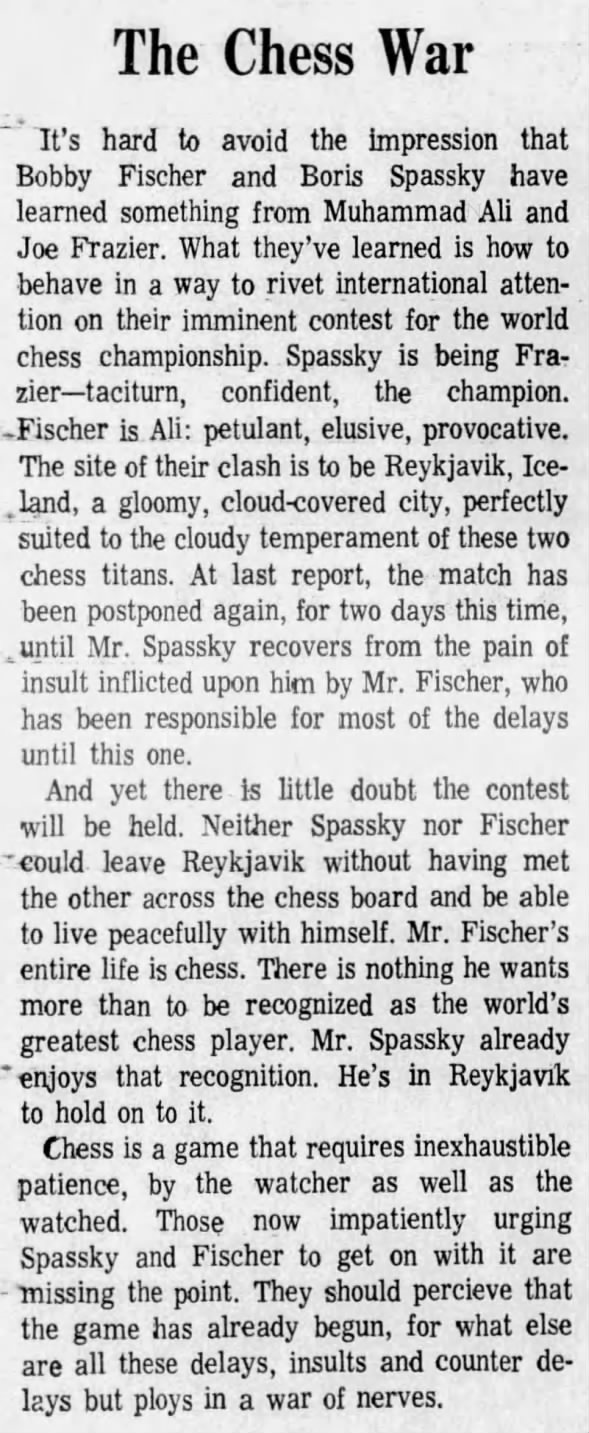 The Chess War 05 Jul 1972, Wed The Evening Sun (Baltimore, Maryland) Newspapers.com
The Chess War 05 Jul 1972, Wed The Evening Sun (Baltimore, Maryland) Newspapers.com
The Chess War
It's hard to avoid the impression that Bobby Fischer and Boris Spassky have learned something from Muhammad Ali and Joe Frazier. What they've learned is how to behave in a way to rivet international attention on their imminent contest for the world chess championship. Spassky is being Frazier—taciturn, confident, the champion. Fischer is Ali: petulant, elusive, provocative. The site of their clash is to be Reykjavik, Iceland, a gloomy, cloud-covered city, perfectly suited to the cloudy temperament of these two chess titans. At last report, the match has been postponed again, for two days this time, until Mr. Spassky recovers from the pain of insult inflicted upon him by Mr. Fischer, who has been responsible for most of the delays until this one.
And yet there is little doubt the contest will be held. Neither Spassky nor Fischer could leave Reykjavik without having met the other across the chess board and be able to live peacefully with himself. Mr. Fischer's entire life is chess. There is nothing he wants more than to be recognized as the world's greatest chess player. Mr. Spassky already enjoys that recognition. He's in Reykjavik to hold on to it.
Chess is a game that requires inexhaustible patience, by the watcher as well as the watched. Those now impatiently urging Spassky and Fischer to get on with it are missing the point. They should perceive that the game has already begun, for what else are all these delays, insults and counter delays but ploys in a war of nerves.
Tallahassee Democrat Tallahassee, Florida Wednesday, July 05, 1972 - Page 1
 Chess Makes Front Page! 05 Jul 1972, Wed Tallahassee Democrat (Tallahassee, Florida) Newspapers.com
Chess Makes Front Page! 05 Jul 1972, Wed Tallahassee Democrat (Tallahassee, Florida) Newspapers.com
Chess Makes Front Page! by Malcolm Johnson
Musing and muttering over the news—
Imagine! Chess getting front page space in American newspapers—and for NOT being played, yet, in Reykjavik!
But that off-and-on world title match between our Bobby Fischer and Russia's Boris Spassky has all the elements of news — international competition, suspense, big cash pot, human contrariness. Everything but the pretty girl, and don't bet one of them won't get into the act before it ends.
Some will sneer that newsmen are accentuating the negative here. But reader demands make news, not newsmen. They only know what folks want to read (or we suppose we do.)
Anyway, this U.S.-U.S.S.R. standoff makes more sense than most of the diplomatic impasses we've had with them for the past quarter century.
It would be odd if an obscure chess player should turn out to be the one American who could beat them at their waiting game.
The Burlington Free Press Burlington, Vermont Wednesday, July 05, 1972 - Page 5
Chess Players Call Fischer Publicity-shy, Spassky Usually Calm by Thomas Kent
(AP) Two top chess players from Connecticut and New York Tuesday described American Grandmaster Bobby Fischer as frightened of publicity and Russian Boris Spassky as a normally calm player who has seemed nervous only once; the last time he played Fischer.
Fischer was scheduled to challenge Spassky in Reykjavik, Iceland, for the world championship, but the match was postponed Tuesday after Spassky protested Fischer's behavior and walked out of a meeting with the match organizers.
Martin Harrow, of North Haven, Conn., the 1967 New England chess champion, said Fischer “was taken advantage of” by reporters who quoted him on many subjects far removed from chess when Fischer was young.
“When he was 13 or 14 he was already in a sense world famous,” Harrow said, “He wasn't too worldly then.”
Harrow, who is a Yale University psychologist, added, “People have profited at his expense. He has some basis for worrying about being taken advantage of.”
Fischer has long shunned publicity and avoided reporters.
“Maybe he's overly worried now,” Harrow said.
The Yale psychologist played to a draw with Fischer in two matches in the 1950s.
Edmar Mednis of New York City, one of about 20 U.S. Senior masters, remembers Spassky from three games he played with the champion.
“He's a sort of normal, quiet man,” Mednis says of Spassky.
“But during his 1970 game against Fischer in West Germany he was visibly much more nervous than Fischer was.
“Spassky normally shows no sign of nervousness, but I think he realized how important that game was. Fischer was known to be his only strong challenger.”
Spassky beat Fischer in that game and Mednis said the Russian chain-smoked his way through it.”
“Boris is basically a very well-rounded person with many normal interests. He has normal feelings, normal emotions. He thinks chess when he is actually playing it or preparing for a tournament.
“Fischer is in a class by himself. His whole life revolves around chess.” Mednis said.
Statesman Journal Salem, Oregon Wednesday, July 05, 1972 - Page 1
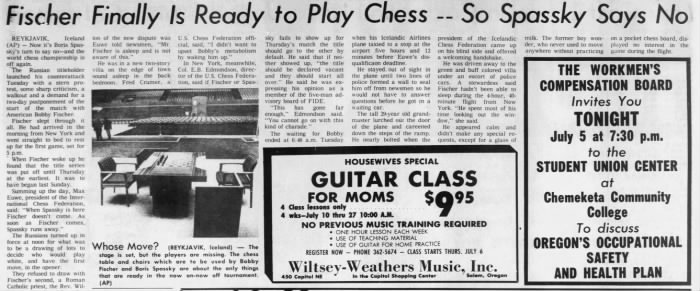 Fischer Finally Is Ready to Play Chess -- So Spassky Says No 05 Jul 1972, Wed Statesman Journal (Salem, Oregon) Newspapers.com
Fischer Finally Is Ready to Play Chess -- So Spassky Says No 05 Jul 1972, Wed Statesman Journal (Salem, Oregon) Newspapers.com
 Fischer Finally Is Ready to Play Chess -- So Spassky Says No 05 Jul 1972, Wed Statesman Journal (Salem, Oregon) Newspapers.com
Fischer Finally Is Ready to Play Chess -- So Spassky Says No 05 Jul 1972, Wed Statesman Journal (Salem, Oregon) Newspapers.com
Fischer Finally Is Ready to Play Chess -- So Spassky Says No
Reykjavik, Iceland (AP)—Now it's Boris Spassky's turn to say no—and the world chess championship is off again.
The Russian titleholder launched his counterattack Tuesday with a stern protest, some sharp criticism, a walkout and a demand for a two-day postponement of the start of the match with American Bobby Fischer.
Fischer slept through it all. He had arrived in the morning from New York and went straight to bed to rest up for the first game, set for 5 p.m.
When Fischer woke up he found that the title series was put off until Thursday at the earliest. It was to have begun last Sunday.
Summing up the day, Max Euwe, president of the International Chess Federation, said: “When Spassky is here Fischer doesn't come. As soon as Fischer comes, Spassky runs away.”
The Russians turned up in force at noon for what was to be a drawing of lots to decide who would play white, and have the first move in the opener.
They refused to draw with Fischer's second, a Roman Catholic priest, the Rev. William Lombardy, and read a statement calling Fischer's delaying holdout intolerable. They protested Euwe's decision to tolerate it.
When Fischer failed to appear Sunday as he should have, Euwe allowed him until noon Tuesday to show up in Reykjavik or forfeit his shot at Spassky.
Fischer's refusal to come by Sunday was based on a dispute with the organizers over money. The argument was settled Monday when British financier James Slater offered to sweeten an already record pot with a donation of 50,000 British pounds—about $130,000. Fischer said he would play.
The Russians said Tuesday that Fischer had violated the rules of the match. They wanted an apology. Euwe reported they had some harsh words for him as well.
“I'm a bad boy,” the 71-year-old Dutchman said with a smile.
Spassky read his statement from what looked like an official document in Russian. It created the impression that he was acting on Moscow's orders.
A dispatch by Tass, the official Soviet news agency, said Spassky had demanded that the International Chess Federation—known as FIDE—take some punishing measures against Fischer on the grounds he had violated the rules of the match. It did not specify what sort of measures should be taken.
Asked about the Tass report, Euwe said no formal request for punishing measures had been received. Besides, he said, “what should I do? Put him in a corner?”
During the days of dispute and bad temper which preceded Fischer's arrival, Spassky had been the picture of courtesy and understanding. When approached by newsmen he had no bad words for Fischer, a man he respects as a chess player. All he would say was that “I came to play.”
There was another indication that Spassky's moves were being plotted in Moscow. After an attempt to come to terms with Fischer's people at a private meeting Tuesday afternoon, Spassky and his second, Yefim Geller, drove grimly to the Soviet Embassy, presumably for consultations.
Asked what Fischer's opinion of the new dispute was Euwe told newsmen, “Mr. Fischer is asleep and is not aware of this.”
He was in a new two-story villa on the edge of town sound asleep in the back bedroom. Fred Cramer, a U.S. Chess Federation official said, “I didn't want to upset Bobby's metabolism by waking him up.”
In New York, meanwhile, Col. E.B. Edmondson, director of the U.S. Chess Federation, said if Fischer or Spassky fails to show up for Thursday's match the title should go to the other by default. he said that if neither showed up,“the title should be declared vacant and they should start all over.” He said he was expressing his opinion as a member of the five-man advisory board of FIDE.
“This has gone far enough,” Edmondson said. “You cannot go on with this kind of charade.”
The waiting for Bobby ended at 6:48 a.m. Tuesday when his Icelandic plane taxied to a stop at the airport five hours and 12 minutes before Euwe's disqualification deadline.
He stayed out of sight in the plane until two lines of police formed a wall to seal him off from newsmen so he would not have to answer questions before he got in a waiting car.
The tall 29-year-old grandmaster lurched out the door of the plane and careened down the steps of the ramp. He nearly bolted when the president of the Icelandic Chess Federation came up on his blind side and offered a welcoming handshake.
He was driven away to the green and buff colored villa under an escort of police cars. A stewardess said Fischer hadn't been able to sleep during the 4-hour, 40 minute flight from New York. “He spent most of his time looking out the window,” she said.
He was driven away to the green and buff colored villa under an escort of police cars. A stewardess said Fischer hadn't been able to sleep during the 4-hour, 40 minute flight from New York. “He spent most of his time looking out the window,” she said.
[★]He appeared calm and didn't make any special requests, except for a glass of milk. The former boy wonder, who never used to move anywhere without practicing on a pocket chess board, displayed no interest in the game during the flight.
Fischer had a visit at the villa from the federation physician, Dr. Ulfar Thordarson, whose approval would be needed for a postponement on medical reasons. Thordarson said Fischer was fit to play.
Before he went to sleep, Fischer came out of the house in his stockinged feet to ask the policemen around the house where the rest of his luggage was.
He got his two overweight leather bags, one of them containing tennis gear, but he complained some packages he'd checked in New York were missing.
Once Fischer is rested up and the Russians choose another line of play, the match may then get under way for unprecedented prize money.
The organizers were offering a purse of $125,000 and half the film rights money.
Slater's donation was in addition to this.
Albuquerque Journal Albuquerque, New Mexico Wednesday, July 05, 1972 - Page 2
Boris Spassky Takes Turn At Stalling
Reykjavik (UPI) — World chess champion Boris Spassky of the Soviet Union Tuesday took his turn at stalling the twice-postponed championship match with his unpredictable American challenger, Bobby Fischer.
The Russian champion, perturbed when Fischer failed to show up for the drawing after his flight from New York Tuesday morning, delivered a protest to chess officials and stomped out of the room, followed by his advisers.
Fischer, 29, tired from the flight, was sleeping in a villa provided by the Icelandic organizers.
Spassky's walkout forced another postponement of the world championship match until Thursday, at the earliest. The match is worth a total prize of $250,000 to be apportioned between the two contenders. The winner is to get $150,000 and the loser $100,000—if they play.
Although the contents of Spassky's formal protest were not immediately known—they were written in Russian—informed chess sources said the documents demanded that the International Chess Federation (FIDE) punish Fischer for his failure to turn up for the first scheduled game Sunday and demanded a personal apology from Fischer.
Spassky, 35, had charged that he and the Soviet Union were “insulted” by Fischer's reluctance to come to the match and demanded he be punished before they began play for the title.
Later, he told newsmen he did not plan to walk out of the match. “I want to play if we can just find a solution.” he said.
U.S. chess officials said Fischer, in hiding at his villa, told them he was “ready and eager to play.”
The Icelandic Chess Federation said the island country's 210,000 chess-mad inhabitants were waiting in suspense for the match to begin. The federation stands to lose revenue from tickets sales if the match is scrapped.
Representatives of Spassky and Fischer met for two and one-half hours late Tuesday but failed to resolve differences.
Attorney Paul Marshall, who with the Rev. William Lombardy, spoke for Fischer said Spassky's advisers submitted two statements — one by Spassky and the other from the Soviet Chess Federation.
“The matter is so delicate that I don't want to reveal the contents,” Marshall said. He added that the discussions “were frank and we will hopefully be able to resume them tomorrow.”
“We are hopeful that we will solve the problems tomorrow so that the match can be played.” Marshall said. He refused to answer questions from newsmen and hurriedly left the conference room with the Rev. Lombardy, a Catholic priest and a chess grand master.
The Russians refused to comment.
The incident was touched off when Spassky arrived for the drawing of lots. When he found Fischer was not there — he was sleeping after his trans-Atlantic flight — Spassky delivered his protest and stomped out of the room, followed by his advisers.
The Birmingham News Birmingham, Alabama Sunday, March 27, 1960 - Page 57
The Lincoln Star Lincoln, Nebraska Tuesday, November 08, 1955
“Olafson said that about 10 per cent of the 160,000 Icelandic population are [Soviets], and as a result there are very many small weekly communistic [Soviet] papers which have much anti-American propaganda.”
The Birmingham News Birmingham, Alabama Sunday, March 27, 1960
Treated as virtual enemy--GI's leaving Iceland won't shed any tears. By James Elliott, Norfolk Ledger-Star Military Affairs writer
Keflavik, Iceland, March 26—(AP)—American servicemen at this bleak, frigid outpost are living behind a glacier curtain—an invisible wall as high and as strong as the Iron Curtain.
It is a barrier behind which Americans silently suffer from indignities, restrictions and embarrassments that few persons back home ever hear about.
U.S. forces were invited to Iceland as protectors nearly 10 years ago by a government afraid of being invaded by Soviets. The Icelandic government asked them to “go home” in 1956, then changed its mind suddenly during Soviet suppression of the Hungarian revolt.
The Army contingent of 1200 men is now being pulled out. It's unlikely the GI's will shed any tears.
The Army says the withdrawal is part of a normal redistribution of troops, a plan which has been under consideration for some time. However, it was announced last year at a time when bad feeling between U.S. military forces and Iceland civilians was at a peak.
TREATED WITH SUSPICION
Approximately 5000 Navy, Air Force and —up to now—Army men in Iceland brave blizzard weather, standing their posts in knee-deep snowdrifts, below freezing temperature and howling, relentless winds. They fly through all types of miserable weather and battle seas that would terrify Neptune. They spend monotonous hours over radarscopes that scan the Arctic horizon toward Russia for unfriendly aircraft.
They are treated with suspicion.([Interesting that Bobby was criticized for his justified distrust of reporters and Soviets, yet, the Soviets find the Icelandic “suspicious” character an admirable quality … enough so to bring their World Championship to Icelandic soil.]) They are searched when they leave the base and restricted in their movements around Iceland. The men are required to be in uniform at all times.
Only 130 a day are permitted passes. The liberty period is limited. The men hardly have time to leave the base, drive over the treacherous, winding 35 miles of ice-covered road to Reykjavik and eat a meal before they must be off the streets.
The Icelanders have imposed a 10 p.m. curfew on American servicemen. On Wednesdays they can remain on the streets until midnight, but on Wednesdays all bars and night clubs are closed.
MORALE LOW
Morale is about as low as Iceland's subterranean hot springs.
The base, Icelanders insist, is not a base but an international airport 100 per cent a part of Iceland.
For that reason Icelandic police have authority throughout the area. They seem extremely zealous in arresting servicemen leaving the clubs at night on charges of drunken driving.
Iceland has very strict drunken driving laws and mandatory blood tests where a person is suspected of being under the influence of alcohol. The test criterion is very low.
“You can have a drink the night before and have one of their blood tests the next day and be declared drunk,” said one officer.
STRANGE CONTRABAND
American dependents living off the base cannot take home items purchased in the base exchange or commissary. Icelandic police search American cars leaving the gate.
A bottle of hair tonic … six rolls of lifesavers and a candy bar … a 65-cent baby's toy … a box of chocolates … two packages of c*gr*ts … and a good old American picnic lunch.
These items are contraband. According to records in the provost marshal's office here, they are among items confiscated from Americans by the Icelandic police.
The Icelanders call it smuggling. They fear the doors will be open to black marketing. Americans often have to face criminal charges in Icelandic court because they had these inconsequential articles in their cars.
Hardest hit by these restrictions are the dependents who are here at their own expense because their husbands chose to serve only one-year tours in Iceland. Approximately 200 families live off the base in apartments or houses rented from Icelanders. They cannot take items purchased in the base exchange or commissary off the post.
Air Force Staff Sgt. James G. Warner of Buckhannon, West Virginia with a wife and two children, rents an unfurnished three-bedroom apartment in Keflavik for $64 a month. Utilities cost an additional $16 a month. Food, however, soars to approximately $125 a month, which is not hay on a sergeant's pay.
The Warners have found that their dietary habits have to conform to Icelandic menus. They eat lots of fish.
ANOTHER CONCESSION
A small party of servicemen left on the countryside without food or water in a survival exercise were condemned as “poachers” in the press. Rather than starve they had attempted to fish in a stream.
This resulted in another American concession. There are no more survival tests.
Maintaining military security on this base seems about as easy as keeping water in a sieve.
The Icelandic government—not the military authorities—issues the passes. Until just recently an estimated 12,000 uncontrolled passes were at large among the Icelandic population. The Americans did not know who had them. And the Icelanders wouldn't tell them.
Recently, however, the Americans on the defense council won a long-standing battle to have those old passes invalidated and new passes issued.
The defense council, composed of four representatives of the Icelandic government and four representatives of the military forces here, administers the 1951 agreement under which American forces are in Iceland.
IMPROVEMENTS?
Invalidating the old passes was one step which Col. Benjamin G. Willis, the Air Force officer who is commander of the Icelandic defense force, feels is pointing to improvements in American-Icelandic coexistence.
The local Icelandic judge, Bjorn Ingvarsson, the Americans feel, has been more lenient in recent months, particularly with “hold orders.”
In the past some accused Americans were forced to remain in Iceland as long as five months beyond their normal tour of duty because the judge had issued an order holding them for court action.
More important, in the eyes of the Americans, has been the appointment of two new Icelandic representatives on the defense council. They are Ludwig Gizurarson and Tomas Tomasson, both young, dedicated men who have been educated in the United States.
With last Summer's elections over, the newspapers have toned down their anti-American campaigns. ([Really? Does that include African Americans?])
The Ottawa Journal Ottawa, Ontario, Canada Wednesday, July 05, 1972 - Page 4
Computer Aid for Fischer? by Ian Westergren
Reykjavik, Iceland (UPI) — The official Soviet news agency Tass said today American chess challenger Bobby Fischer planned to use a computer to try to beat world champion Boris Spassky ([complete with 5G, Intel inside and time travel attachment… no? because computer chess programs that could actually defeat grand masters level of play hadn't been invented in 1972. However, chess programs could accomplish a sweeping defeat if playing against a grand master of either Spassky or Fischer's level of skill. Again, the Soviet is depending upon credulity of their listeners, for the success of their rumors to spread]) if the on-again-off-again match ever gets underway.
The match was postponed for the second time Tuesday after Spassky said Fischer insulted him by not showing up for the pre-match ceremonies. Fischer, who won a two-day postponement, did not attend because he was in New York bargaining for more prize money.
If a solution is worked out, the 24-game series could start Thursday.
“It has been learned in journalist circles here that Fischer's patrons have worked out rather original playing tactics for the match in which they were not guided by chess interests,” Tass said.
The news agency said Fischer's followers had worked out an arrangement with a computer center to transmit each move and the computer would calculate a counter-move.
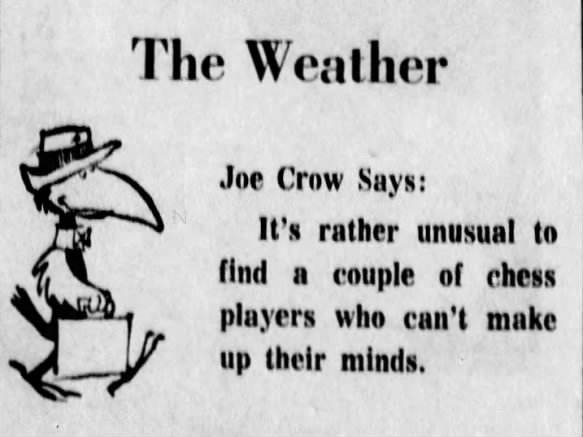 Joe Crow 05 Jul 1972, Wed The Indianapolis Star (Indianapolis, Indiana) Newspapers.com
Joe Crow 05 Jul 1972, Wed The Indianapolis Star (Indianapolis, Indiana) Newspapers.com
The Des Moines Register Des Moines, Iowa Wednesday, July 05, 1972 - Page 02
Chess Match in Doubt; Spassky Orders Apology by Joe Alex Morris, Jr.
Reykjavik, Iceland — The stalled world chess championship was further jeopardized Tuesday by a Russian demand that American challenger Bobby Fischer apologize before his first match with titleholder Boris Spassky.
The Soviets, criticizing the way the match has been handled, stepped up their attacks shortly after the 29-year-old American arrived. They demanded — and got — a second delay in the opening game, and it was not completely clear whether they would agree to play Thursday.
If not, International Chess Federation President, Dr. Max Euwe warned, “I shall have to take measures” against the Russians, and he spoke of an ultimatum to get Spassky to the chess board. Fred Cramer of the American team here indicated Fischer would not give in to the Russian demand.
“I can not see Fischer apologizing.” he said. “He feels he's done nothing wrong.”
To Gain Edge?
It was not clear if the Russians simply were adopting tactics to gain the psychological edge for the 35-year-old Spassky. The Americans had asked for the postponement of the first 24 matches for the world crown last Sunday.
“I am not clear on what the situation is,” confessed Euwe. “I don't understand it myself.”
But chief arbiter Lothar Schmid said the Russians were demanding “unspecified punishment” for Fischer for his defiance of international rules. The Soviets handed Schmid a formal complaint, which attacked both Fischer and Euwe.
The Russians said Euwe should have disqualified Fischer when he failed to arrive Sunday for the first game. At the time, Euwe broke the rules to save the match, but the Russians made no objection.
Both Euwe and Schmid refused to specify what the Russian complaints were, and Euwe indicated they were vague. “They said there were certain problems, but when he asked what they were, they didn't tell us,” Euwe said.
But Yugoslav grand master Svetozar Gligoric, a friend of both Spassky and Fischer, said the Russians wanted the American to apologize for his behavior. Fischer refused to come to Iceland until a British banker doubled the prize money Monday.
“Spassky is the titleholder,” Gligoric said. “He feels the challenger should apologize.”
Arrives Tuesday
Fischer arrived early Tuesday morning from New York having appropriated a whole row of seats on the jet for himself. He was whisked directly into a waiting Mercedes limousine, surrounded by police, who kept photographers at bay. He did not go through immigration, but went directly to a new luxury bungalow which was built for the first prize winner in next fall's state lottery. He appeared shortly thereafter in slacks and T-shirt to ask his police guard about missing pieces of luggage.
Then he slept, as his aides met with the Russians over their differences, including the Russian demand that Fischer apologize.
Fischer did not show up for the drawing of lots scheduled for noon, to see who will move first on the chess board. Spassky did.
Will Decide When
Asked whether he had asked for a two-day postponement, the Russian champion said, “I still want to play. But I will decide when.”
During the days of dispute and bad temper which preceded Fischer's arrival, Spassky had been the picture of courtesy and understanding. When approached by newsmen, he had no bad words for Fischer, a man he respects as a chess player.
There was another indication that Spassky's moves possibly were being plotted in Moscow. After an attempt to come to terms with Fischer's people at a private meeting Tuesday afternoon, Spassky and his second, Yefim Geller, drove grimly to the Soviet Embassy, presumably for consultations.
Fischer was represented in negotiations by lawyer Paul Marshall and Father William Lombardy, who will be his second when the match starts. The talks will continue Wednesday.
Although Euwe said the show finally must start Thursday — four days late — it was obvious it could not start until the Americans and the Russians settled their differences. Beyond that, Fischer still has to approve the arrangements for the game, a possible major hurdle.
In New York, meanwhile, Col. E. B. Edmondson, director of the U.S. Chess Federation, said if Fischer or Spassky fails to show up for Thursday's match, the title should go to the other by default. He said that if neither showed up, “the title should be declared vacant and they should start all over.”
The Guardian London, Greater London, England Wednesday, July 05, 1972 - Page 11
Pawns In A Panto from Michael Lake
Reykjavik, Tuesday — Bobby Fischer's arrival in Iceland to play for the World Chess Championship was not the sort of stuff for which Handel wrote, “See the conquering hero comes.”
The television team with the exclusive world rights to film, missed his leap from the aircraft steps into his car because the cameraman was doing up his jacket. Then Fischer found that someone had removed many of the curtains from his private villa where he was to sleep. In the harsh permanent Icelandic daylight this was not good.
When Fischer's plane landed at Keflavik, his representative here, Mr. Fred Kramer, Vice-President of the International Chess Federation, became extremely agitated about the lack of protection for his charge. He pointed this demand at Mr. Chester Fox, who owns the exclusive film rights: Mr. Fox declared with equal agitation that he was not responsible for security.
While this altercation was going on Mr. Fischer sped away with a police escort, followed by a television set and a lot of food. Unfortunately Icelandic television is suspended until August 1 for annual holidays but he will be able to see re-runs of canned programmes from the NATO base at Keflavik. Mr. Fischer is a television and transistor radio addict.
At the villa set aside for him — soon to be a lottery prize in support of retired seamen — police set up a road block. But since the building stands on a new housing estate open to the world everyone simply threaded their way through the bricks and over mounds of earth to his front door.
There the ubiquitous Mr. Kramer was complaining in ear-piercing whispers that the challenger could not sleep because of the disappearance of the curtains and with all these people shambling about. He whispered to a policeman that it was private property and would he get these people out of here. The policeman waved vaguely at the surrounding landscape in a gesture of helplessness.
Mr. Kramer then confronted the President of the Icelandic Chess Federation, Mr. Gunnar Thorarinsson, from a distance of six inches and whispered to him that he had to have more curtains. Mr. Thorarinsson said if Fischer wanted more curtains he would get them. “Don't worry” he said. “Don't worry?” roared Mr. Kramer, sill managing to whisper.
Fischer appeared at the door in red pants and a white shirt. He liked the house, but it was kinda small.
Fischer managed to get to sleep, however, by the time the draw was announced at noon. The Russian champion, Boris Spassky, waited 20 minutes for Fischer refusing to accept his seconds as substitutes and walked out. The Soviet Chess Federation sent a vitriolic cable to the president of the International Chess Federation, Professor Max Euwe, accusing Fischer and himself of wrecking the championship.
The imperturbable Dr. Euwe, who has been making up his own rules since Sunday to save the match, declared that he did not know any longer what was going on, and he was pessimistic.
The Soviet tactics appeared by now to have a cutting edge. Having complained vaguely at Sunday's two-day postponement of the match in defiance of the rules they had awaited Fischer's arrival before threatening to walk out.
Over lunch Spassky ruled out any play tonight but he said he was not yet leaving the country. If he did, however, and Fischer was ready to play, both sides could have accused the other of defaulting. The question arose again about the distribution — if any — of the prize money. Dr. Euwe has no suggestions about this either.
Amid all this unbelievable confusion only Dr. Euwe appeared still to have his head above water — and this was perhaps only because he could express the confusion most clearly. A rumour grew that he himself had to leave Reykjavik tomorrow. A battle-scarred reporter from the Daily Mirror announced that if Dr. Euwe was leaving, then he was leaving too.
This evening, however, the Americans and Russians have got together and it appeared that there was a good chance of everyone's becoming mates again. Fischer stayed asleep.
Florence Morning News Florence, South Carolina Wednesday, July 05, 1972 - Page 4
For Chess a Capitalistic Turn
Americans, addicted as they are to more bruising sports, have difficulty whipping up a lot of enthusiasm for a chess match — even if it is the world championship match pitting against Russian titleholder Boris Spassky.
If and when the match finally gets underway, it's hard to envision a contest that will exceed the drama of the preliminaries, even for avid chess fans. The first game was scheduled to begin Tuesday in Reykjavik, Iceland, but Spassky accused Fischer of violating the rules and refused to play.
That was only the latest of a series of hitches that have threatened to cancel the match entirely.
First Fischer and Spassky ([The Soviet Regime. Spassky was not present and making the declarations.]) jostled over the site of the showdown match. Fischer favored Belgrade, Yugoslavia, while Spassky ([The Soviet delegation. Spassky was not present.]) favored Reykjavik. A compromise under which the tournament would be played in both cities fell through.
The match could run 24 games unless a winner emerges earlier. Fischer is given a slightly better than even chance at dethroning Spassky. But skeptics point out that Spassky has beaten Fischer in all five of their previous matches.
In any case, Americans in general will not be hanging on to every move as they might in, say, a super bowl football game. Chess is widely regarded by Americans as boring and strictly a game for the cerebral elite.
But tests made in 1970 at Temple University concluded that chess is a game that calls for prodigious amounts of physical as well as mental exertion. To determine how much energy is actually expended by a chess player during tournament play, bio-kinetic readings of pulse, heartbeat and other psychological measurements were taken on 12 volunteer players.
Surprisingly, it was found that chess is as physically taxing as a strenuous session of boxing or football.
From the way things are shaping up in Reykjavik, keeping physically fit seems to be at least as essential for coping with the preliminaries of a match as the match itself.
St. Cloud Times Saint Cloud, Minnesota Wednesday, July 05, 1972 - Page 1
About People - James Slater
At London, James Slater, the man who put up the money which apparently persuaded Bobby Fischer to fly to Iceland for the world champion chess matches, expressed dismay Tuesday when he learned the Russian champion Boris Spassky would not agree to start play.
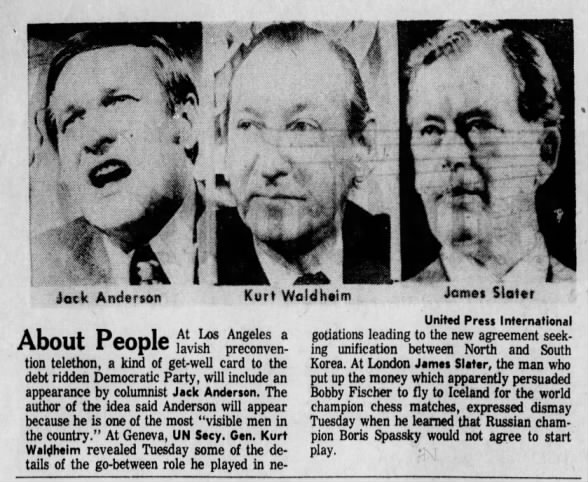 About People - James Slater 05 Jul 1972, Wed St. Cloud Times (Saint Cloud, Minnesota) Newspapers.com
About People - James Slater 05 Jul 1972, Wed St. Cloud Times (Saint Cloud, Minnesota) Newspapers.com
The Windsor Star Windsor, Ontario, Canada Wednesday, July 05, 1972 - Page 24
Apology by Fischer May Be Too Late by Star Wire Services
Reykjavik, Iceland — Bobby Fischer has apologized to Boris Spassky for delaying the start of their $300,000 match, but Fischer's change of heart may have come too late to save their world championship battle.
Fischer said he had the greatest respect for Spassky as a man and a player, but the championship series now hinges upon resolving the Soviet Chess Federation's demand that Fischer forfeit the first of 24 games to the reigning world champion.
“If the Soviets insist on this penalty I believe the whole match is off,” said Dr. Max Euwe, president of the International Chess Federation (FIDE).
“The Soviet demand came in a telegram to Euwe and cited one paragraph of the agreement to play signed by both Fischer ([no, I really don't think so, says an article from the New York Times, dated July 03, 1972, Chess Title Match Put Off Two Days On Plea by Fischer by Harold C. Schonberg, “The 29-year-old American has never signed a contract—he never signs anything—but he did send the International Chess Federation a telegram saying he would play the match in Iceland, under protest. That telegram would constitute legal acceptance, in the opinion of Dr. Euwe. The Icelandic Chess Federation stands to lose at least $75,000 is the match is not held.”]) and Spassky in which they agreed that a player who does not turn up within one hour of the game time forfeits the game.
Euwe said the telegram arrived shortly after Fischer, who has remained in seclusion since he arrived in Reykjavik early Tuesday, issued his apology.
Earlier in the day, the Russians broke off the talks with Fischer's representatives which started Tuesday after Spassky triggered the second postponement of the series by saying Fischer had insulted him by not showing up for the pre-match ceremonies. Spassky then said he would not play until FIDE punished Fischer and Fischer had personally apologized.
The reason for the breakup was not immediately disclosed but Spassky's representatives said they would explain later at a news conference.
The championship was scheduled to start Sunday, but Fischer, a 29-year-old chess genius from Brooklyn, failed to turn up, mostly because he wanted more money than the $125,000 purse put up by the organizers.
All appeared saved when a British millionaire banker—and chess fan—dug into his own pocket to offer another $125,000. Fischer was on the next plane to Reykjavik and arrived Tuesday morning, where he quickly left the airport not to be seen since.
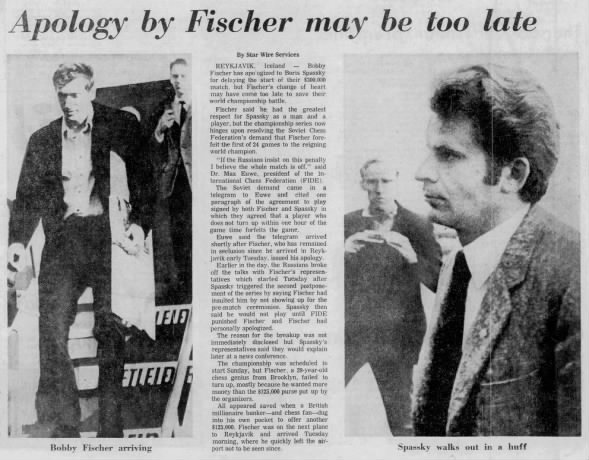 Apology by Fischer May Be Too Late 05 Jul 1972, Wed The Windsor Star (Windsor, Ontario, Canada) Newspapers.com
Apology by Fischer May Be Too Late 05 Jul 1972, Wed The Windsor Star (Windsor, Ontario, Canada) Newspapers.com
The Los Angeles Times Los Angeles, California Wednesday, July 05, 1972 - Page 1
Chess Waits But The Ploys Go On: Russians Insist That Fischer Apologize Before First Match by Joe Alex Morris, Jr.
Reykjavik, Iceland—The stalled chess championship was further jeopardized Tuesday by a Russian demand that American challenger Bobby Fischer apologize before his first match with titleholder Boris Spassky.
The Russians stepped up their attacks on the way the match has been handled shortly after the 29-year-old American arrived. They demanded —and got— a second delay in the opening game, and it was not completely clear whether they would agree to play Thursday.
If not, International Chess Federation President Dr. Max Euwe warned, “I shall have to take measures” against the Russians, and he spoke of an ultimatum to get Spassky to the chessboard. Fred Cramer of the American team here indicated Fischer would not give in to the Russian demand.
“I cannot see Fischer apologizing,” he said. “He feels he's done nothing wrong.”
It was not clear whether the Russians were simply adopting new tactics to regain the psychological edge for the 35-year-old Spassky. The Americans had asked for the postponement of the first of 24 matches for the world crown last Sunday.
“I'm not clear what the situation is,” confessed Euwe. “I don't understand it myself.”
But chief arbiter Lothar Schmid said the Soviets were demanding “unspecified punishment” for Fischer for his defiance of the international rules. The Russians handed Schmid a formal complaint, which attacked both Fischer and Euwe.
“The Soviet note was all insults against us. We are both bad boys,” Euwe said.
There is a certain never-never quality about this elderly Dutchman which so far has served to defuse the tension in these preliminary struggles. Asked whether he accepts the Russian charges against him, he said: “They say I am violating all the rules. Of course I agree with them.”
Both Euwe and Schmid refused to specify what the Russian complaints were, and Euwe indicated they were vague. “They said there were certain problems, but when we asked what they were, they didn't tell us,” Euwe said.
But Yugoslav grand master Svetozar Gligoric, a friend of both Spassky and Fischer, said the Russians wanted the American to apologize for his extraordinary behavior. Fischer refused to come to Iceland until a British banker doubled the prize money Monday.
“Spassky is the titleholder,” Gligoric said. “He feels the challenger should apologize.”
Fischer arrived early Tuesday morning from New York, having appropriated a whole row of seats on an Icelandic jet for himself. He was whisked directly into a waiting Mercedes limousine surrounded by Icelandic police who kept photographers at bay.
He did not go through immigration, but went directly to a brand-new luxury bungalow which was built for the first prize winner in the state lottery next fall. he appeared shortly thereafter in slacks and tee shirt to ask his police guard about missing pieces of luggage.
Then he went to sleep as his aides met with the Russians over their outstanding differences, including the Russian demand that Fischer apologize. They did not include money, however. Euwe said the Russians appeared to accept the doubling of the prize money by a capitalist British banker, Jim Slater.
Fischer did not show up for the drawing of lots scheduled for noon to see who plays first. Spassky did. Efforts had been made to reach him at his hotel to tell him to send only a second since Fischer wasn't going to be there himself, but no one could get through to him. The switchboard operator had orders to relay no calls to his room.
Later, Spassky had a beer with his lunch, “I don't play today,” he said.
Asked whether he had asked for a two-day postponement, the Russian champion said “I still want to play. But I will decide when.”
Euwe later pronounced himself a bit more optimistic that there will be a chess match here after all. “Both are willing to play,” he said.
The question was when. Neither wants to give the other a psychological advantage at the start.
“Neither wants to beat a sick man,” said Fred Cramer of the American Chess Federation.
The Russian-American negotiations involved neither principal. Fischer was represented by lawyer Paul Marshall and Father William Lombardy, who will be his second when the match starts.
They talked with Spassky's deputies fro two and a half hours. For reasons best known to himself and upon which he flatly refused to elaborate, Marshall said the Russian complaints caused “some shock and surprise” in the Fischer camp.
The negotiations will continue today, and Marshall said they hope to resolve them then.
Lombardy, on the other hand, said the difficulties were “relatively minor” and had been blown up into major differences. As has been consistently true of the Americans here, they continued to speak with different if not contradictory voices.
Although Euwe said the show must finally start Thursday, four days late, it was obvious it could not start until the Americans and the Russians settled their problems. Beyond that, Fischer still has to approve the arrangements for the games, and this could be a major hurdle.
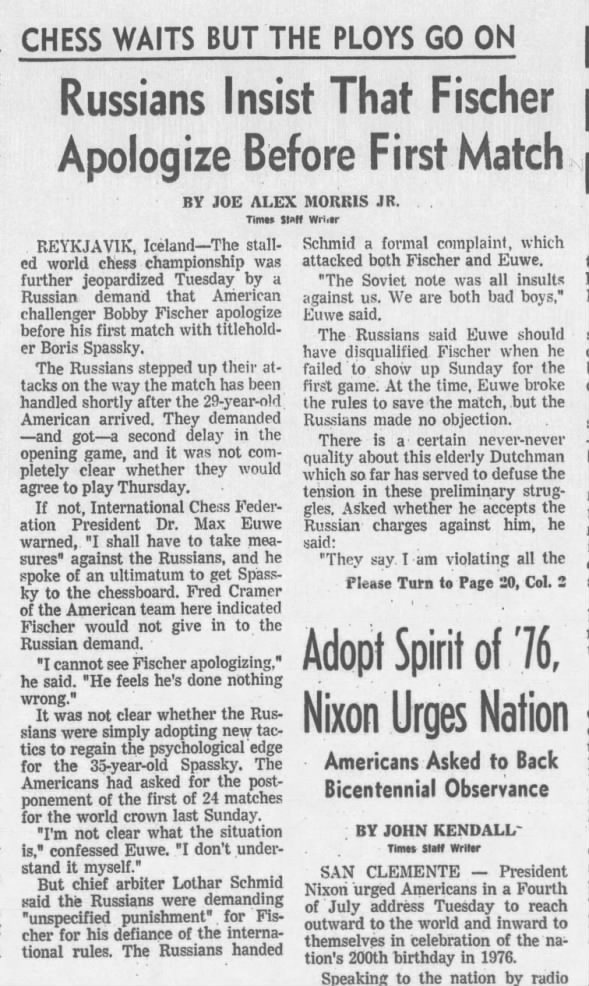 Russians Insist That Fischer Apologize Before First Match 05 Jul 1972, Wed The Los Angeles Times (Los Angeles, California) Newspapers.com
Russians Insist That Fischer Apologize Before First Match 05 Jul 1972, Wed The Los Angeles Times (Los Angeles, California) Newspapers.com
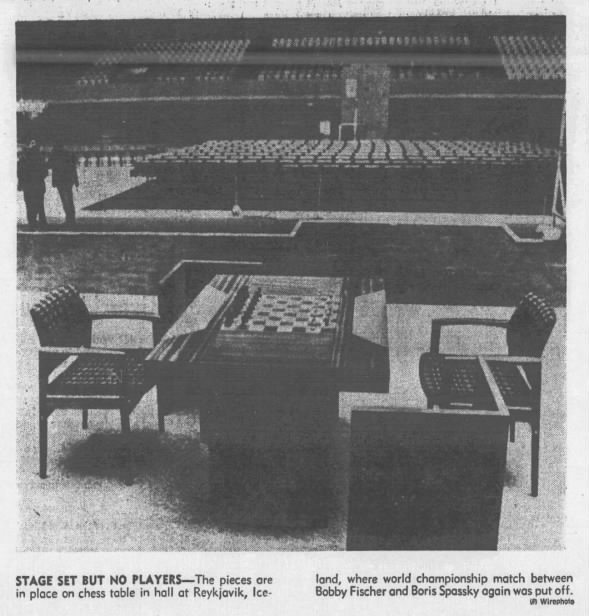 Stage Set But No Players 05 Jul 1972, Wed The Los Angeles Times (Los Angeles, California) Newspapers.com
Stage Set But No Players 05 Jul 1972, Wed The Los Angeles Times (Los Angeles, California) Newspapers.com
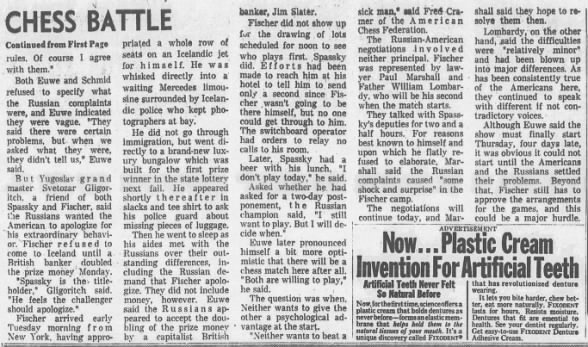 Chess Battle 05 Jul 1972, Wed The Los Angeles Times (Los Angeles, California) Newspapers.com
Chess Battle 05 Jul 1972, Wed The Los Angeles Times (Los Angeles, California) Newspapers.com
The Los Angeles Times Los Angeles, California Wednesday, July 05, 1972 - Page 2
Outlook for Match Brighter: Russians Prepared to Accept Chess Apologies by Fischer
(Reuters) Reykjavik—The Russians said tonight they would be ready to accept apologies for the way their world chess champion Boris Spassky has been treated by his challenger Bobby Fischer, and there seemed a real chance that the twice-postponed title match would begin Thursday.
The Russian delegation spokesman, chess grandmaster Ewfim Geller, said they had dropped a demand that Fischer should forfeit the first game as a penalty for his absence last weekend when the chess encounter was scheduled to begin.
Some officials thought, however, that the start of the match might finally be fixed for Sunday, to give Spassky time to recover from the emotions of the past few days.
The apologies were flowing here today, and the only question was whether their form would be right for Spassky and his aides. The Russians wanted them in writing.
The immediate reaction of American chess officials was that the way had now been cleared for the start of the match. They thought Spassky would accept a statement made of the match. They thought Spassky would accept a statement made today by Fischer as an apology, even though he avoided accepting blame for the tournament's troubles.
Fischer's message of apology said:
“We are sorry that the world championships were delayed. The problems causing the delays were not with world champion Spassky who I respect as a player and a man.
“If grandmaster Spassky or the Soviet people were inconvenienced or discomforted I am indeed unhappy for I had not the slightest intention of this occurring.”
The start was postponed from last Sunday while Fischer stayed in New York, bargaining for more money. It was postponed a second time Tuesday after Spassky said Fischer insulted him by refusing to show up to draw lots to see who got to make the first move. He demanded Fischer apologize and said the federation must censor Fischer.
The Honolulu Advertiser Honolulu, Hawaii Wednesday, July 05, 1972 - Page 31
Chess Pains Continue
Reykjavik, Iceland (UPI) — World chess champion Boris Spassky of the Soviet Union yesterday took his turn at delaying the twice-postponed championship match with his unpredictable American challenger, Bobby Fischer.
The Russian champion, perturbed when Fischer failed to show up for the drawing after his flight from New York yesterday morning, delivered a protest to chess officials and stomped out of the room, followed by his advisers.
Spassky's walkout forced another postponement of the world championship match until Thursday, at the earliest.
Although the contents of Spassky's formal protest were not immediately known—they were written in Russian—informed chess sources said the documents demanded that the International Chess Federation punish Fischer for his failure to turn up for the first scheduled game Sunday and demanded a personal apology from Fischer.
Daily News New York, New York Wednesday, July 05, 1972 - Page 105
Chess Furor: Spassky's Move -- He Walks Out
Knight Errant? American chess grandmaster Bobby Fischer ignores the crowd as he leaves plane at Reykjavik, Iceland, airport yesterday shortly before he was set to meet Russia's Boris Spassky. As Bobby ended his holdout, Spassky walked out. If international chess officials can sooth Boris, world championship play may start Thursday.
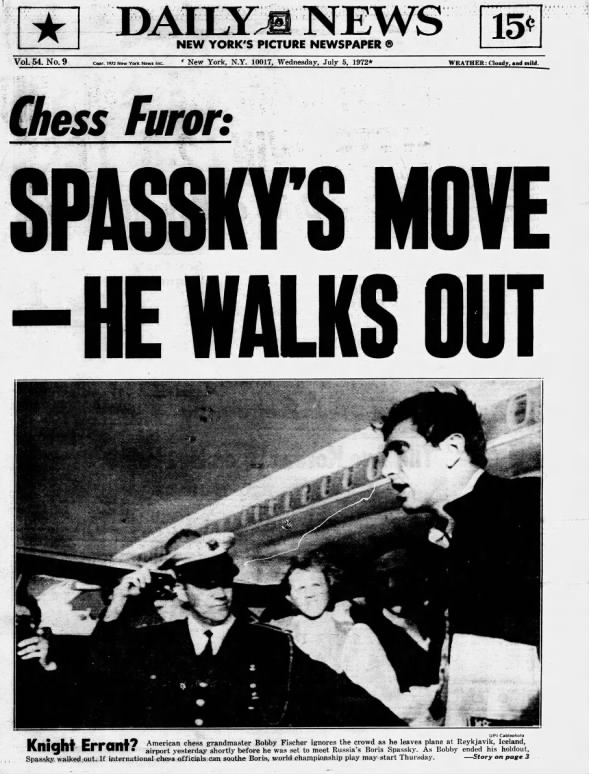 Chess Furor: Spassky's Move -- He Walks Out 05 Jul 1972, Wed Daily News (New York, New York) Newspapers.com
Chess Furor: Spassky's Move -- He Walks Out 05 Jul 1972, Wed Daily News (New York, New York) Newspapers.com
The Spokesman-Review Spokane, Washington Wednesday, July 05, 1972 - Page 1
Soviet Temperament
Reykjavik, Iceland (NYT) — After a day of silence from Bobby Fischer, a display of temperament from the Soviet delegation, yet another postponement of the world's championship chess match, charges and counter charges, it looks as if the opening game might take place on Thursday, barring, of course, the unforeseen.
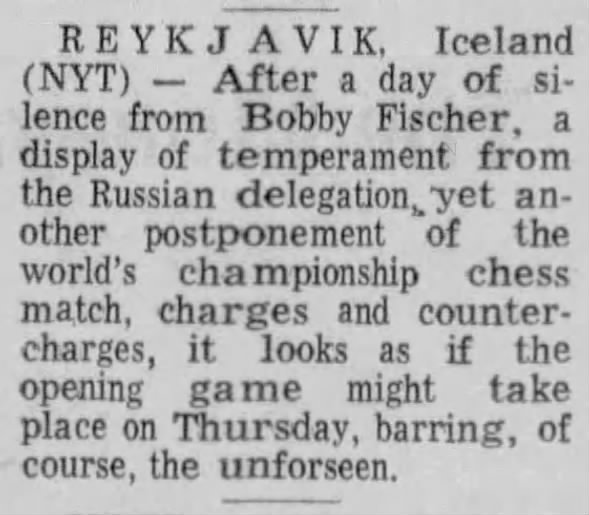 Soviet Temperament 05 Jul 1972, Wed The Spokesman-Review (Spokane, Washington) Newspapers.com
Soviet Temperament 05 Jul 1972, Wed The Spokesman-Review (Spokane, Washington) Newspapers.com
The Miami News Miami, Florida Wednesday, July 05, 1972 - Page 29
No Language Barrier in Iceland: Today's Heartburn by Herb Rau
Reykjavik, Iceland — For Americans, the Icelandic language is an impossibility. There are 33 letters in the alphabet, the language is similar to Danish (which is also an impossibility to American tourists), and even the popular historian Sigurdur Magnusson of Icelandic Airlines comments: “It is singular that the Icelanders should have kept alive a tongue whose fundamental significance among Scandinavian nations is equivalent to that of Greek and Latin among others.” … Fortunately, most Icelanders either speak or understand English, so an American tourist will find no language barrier here. Even the 6 p.m. news on radio is broadcast in English, via flawlessly-accented commentators … But Iceland, with its mere 200,000 inhabitants, is an odd little independent nation. Warmed by the Gulf Stream, its summers are mild … One TV station broadcasts from 7 to 11 p.m., except on Thursdays when it's dark, and for an entire month in the summer when its staff vacations … There are no nightclubs, but several dancing places.
Five Tabloid Newspapers
Troops are permitted off base on Wednesdays and incidentally, Wednesday nights are “dry nights” in Iceland. Sale of Whiskey on those nights is prohibited. Coincidentally, of course … There are five daily newspapers here, all tabloid, with the “Morgunbladid,” the morning paper, having the largest circulation even though it's a right wing paper in a liberal government … The government has said it would like to dissolve the NATO base here, but recently renewed its contract … There's some anti-American feeling (if you ask outright), based on U.S. involvement in Vietnam ([those Anti-American along with racist sentiments went much farther back than Vietnam! Decades, espoused by Soviet underground and the government itself, in Iceland]). But the only outward sign I detected was the name “NIXON” painted in red on a white building, with the “X” in Nixon depicted as a sw*st!ka …
Chess is a Big Deal Here
The current world title chess tournament controversy may be the biggest thing to hit Iceland since Leif Ericsson. Boris Spassky, the Russian champ, is lionized and he loves it. Bobby Fischer, the young American contender, held out for more loot … ([Considering the decades of abusive Anti-American and racist atmosphere, Bobby Fischer should've held out for 5 x the loot. No amount of money is worth the Soviet hornet's nest thrust upon him.])
 No Language Barrier in Iceland 05 Jul 1972, Wed The Miami News (Miami, Florida) Newspapers.com
No Language Barrier in Iceland 05 Jul 1972, Wed The Miami News (Miami, Florida) Newspapers.com
Reno Gazette-Journal Reno, Nevada Wednesday, July 05, 1972 - Page 4
Fischer's Most Excellent Performance
American chess master Bobby Fischer has a reputation as a feisty, immature and self-centered person. ([Yes, because the Soviets weren't fond of losing their titles. Such things were said of their own champions in official Soviet media outlets, when their players failed to bring home the crowns to the USSR]).
Fischer is living up to that image as he prepares to meet Boris Spassky in Iceland in an attempt to wrest the world championship away from the ([Soviet Union's vast worldwide network of human machinery]).
The match had been scheduled to open Sunday, but Fischer refused to board an airplane for Iceland until ([not the sponsor. The author of this column hasn't gathered a correct set of facts to go upon to form a proper opinion]) an investment banker, and chess benefactor in Britain offered him more money. ([But the problems were much deeper than simply money, and Fischer only agreed to play in Reykjavik, Iceland “under protest” and never offered so much as a formalized contract to do so.])
The ensuing uproar threatened to cancel the long-awaited meeting altogether as an angry ([Soviet delegation and Moscow officials]) complained they had not agreed to a postponement ([neither had they officially contested the postponement, either.])
Chances are the match will go on, even if some time off schedule. The meeting has attracted an unusual amount of interest in a rather obscure pursuit. To back out now will be to disgrace the defaulting participant in the eyes of the watching world.
That can't undo the unhappy effects of Fischer's mercenary performance, however, ([nor can Soviets agreeing to continue play, undo the unhappy effects how Iceland was chosen by the Soviet due to its widespread Anti-American and ultra-racist atmosphere for which Fischer has the misfortune of being thrust into by connivance of Soviet organizers. Nor how Belgrade organizers refused to communicate with Fischer man to man, to iron out details from the outstart, all the way back since January 1972, when Spassky was forbidden by the Soviet Union to travel for negotiations preceding the match. Also missing mention here is Belgrade's illegal 35,000 USD demand for a guarantee which the USCF declined to pay. Or, how plots were underway to disqualify Fischer based on a non-stop Soviet rumor mill, replacing the challenger with a Soviet. How the match was put in Iceland to censor coverage due to lack of modern communications, resulting in a black out, when Fischer wanted his friends in the American continents to see the match. Much and much more, remains untold by the author. The rewards Fischer received from winning the 1972 match, can never come close to matching the years of grief heaped upon him by Soviet detractors for years; before, during and after the '72 affair.])
One can't fault Fischer, perhaps, for seeking all the compensation he can get. His is an extraordinary talent in a highly sophisticated game, and the match with the Russian might be compared to a heavyweight fight-of-the-century in the boxing world.
But, for the sake of appearance at least, Fischer should have settled the preliminary arrangements months ago. (SEE ABOVE. Attempts were made by USCF Edmondson who criticized Belgrade and FIDE, et al, for their refusal to sit down with Robert Fischer, face to face, man to man, and work out said differences, months earlier. See Associated Press, April 04, 1972, “Edmondson, who up to last week was Fischer's negotiator, said here Monday that one of the main participants, the Belgrade organizers, withdrew from the initial agreement last week. “How can Mr. Fischer be asked to comply with an agreement already apparently invalidated by the withdrawal of one of the parties?” Edmondson said, “The next step should be contact, and I mean full contact, between the president and the players.” But the European and Soviet parties refused to go about things in an orderly, mature manner.) His last-minute grandstand play discredits ([THE SOVIETS and their lackeys]) and, to some extent, the ([SOVIET UNION]).
 Soviet Political Propaganda / Smear Campaign 05 Jul 1972, Wed Reno Gazette-Journal (Reno, Nevada) Newspapers.com
Soviet Political Propaganda / Smear Campaign 05 Jul 1972, Wed Reno Gazette-Journal (Reno, Nevada) Newspapers.com
Wisconsin State Journal Madison, Wisconsin Wednesday, July 05, 1972 - Page 1
Fischer Shows Up In Iceland, Goes to Bed; Now Boris Is Mad by Harold C. Schonberg
(NYTimes) — Reykjavik, Iceland — Bobby Fischer arrived here Tuesday morning, said nothing, and went to bed.
He slept through a day that saw another postponement of his world championship chess match with Boris Spassky, a display of temperament from the Russian delegation, and a good possibility that the opening game will take place on Thursday.
NOW THAT the financial aspects of the match have been settled, it appears that the issues separating both parties are personal. The Russians are objecting to what they regard as Fischer's high-handed behavior, and are also calling Dr. Max Euwe's competence into question. Euwe is president of the International Chess Federation.
Possibly the Soviets are now engaged in their own war of nerves. Fischer made them wait, so now they will make Fischer wait, and see what that does to his equilibrium.
The Russians, headed by Spassky, the world champion, emerged angrily from a morning meeting with Euwe.
SPASSKY SAID later that in his opinion Euwe had committed any number of procedural errors. He also said he wanted an apology from Fischer. “I represent not only myself but also the Russian people,” he said.
The champion was echoing remarks made earlier in the day by the Russian chess federation, which has been attacking Euwe and also condemning Fischer's “money mania” and “selfishness.”
Euwe, 71, said that he head received a cable of protest from the Russian chess federation. The tall, courtly former world's chess champion told a news conference that the attack did not bother him. He refused to disclose the exact wording of the telegram.
“FIRST the Americans attacked me, and now the Russians,” Euwe said. “Therefore I know I am following a correct middle course.”
Arriving with Fischer this morning were the Rev. William Lombardy and Paul Marshall. Fr. Lombardy, a Catholic priest and an international grandmaster in chess, will act as Fischer's second. Marshall is Fischer's attorney.
Both disappeared into a series of conferences with the Russians to discuss grievances outlined by Spassky in a message to the American group.
FRO. LOMBARDY said at an evening news conference that negotiations, though delicate, were proceeding on a friendly basis. A meeting is scheduled for tomorrow, he said, and he hoped that all issues would them be satisfactorily resolved. If they are, the match can start on Thursday.
Several grandmasters, in discussing the Russian tactics, had varying opinions on the subject. One school of thought held that Spassky should have demanded a game tonight, while Fischer was still in the process of adjusting his biological clock. Others said no, that Spassky was too angry to play his best game and should wait until he simmers down.
Spassky, these experts said, is more of an attacking player than the precise Fischer, and in his eagerness to punish the American he might launch an unsound attack that would be suicidal.
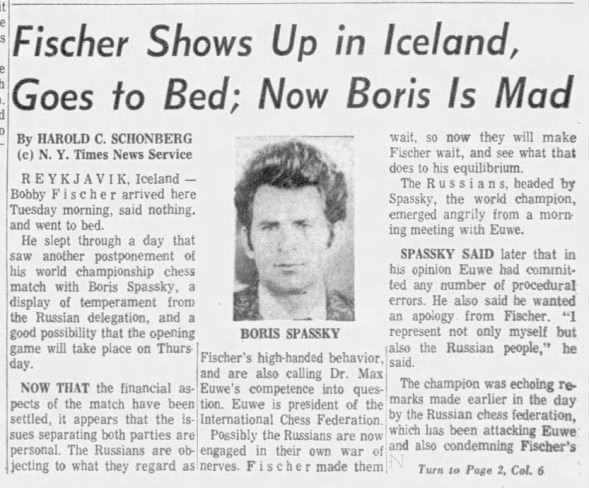 Fischer Shows Up In Iceland, Goes to Bed; Now Boris Is Mad 05 Jul 1972, Wed Wisconsin State Journal (Madison, Wisconsin) Newspapers.com
Fischer Shows Up In Iceland, Goes to Bed; Now Boris Is Mad 05 Jul 1972, Wed Wisconsin State Journal (Madison, Wisconsin) Newspapers.com
The Parsons Sun Parsons, Kansas Wednesday, July 05, 1972 - Page 10
Fischer Is ‘Sorry’ For Chess Delay
Reykjavik, Iceland (AP) — Bobby Fischer apologized today for delaying the start of his $300,000 chess match with world champion Boris Spassky of Russia.
The American, whose dispute over prize money forced organizers to postpone the world championship round, said he had the greatest respect for Spassky as a man and as a player.
The statement, prepared by Fischer's lawyers, was read to newsmen by Max Euwe, president of the International Chess Federation— FIDE.
It was not known whether this would be sufficient to overcome Soviet objections to starting the match.
Euwe said later, however, the Soviet Chess Federation had cabled him demanding that he call the first game a loss for Fischer because of the American's late arrival. This would give Spassky a significant but not insurmountable advantage at the outset of the 24-game match.
In a statement Tuesday, Spassky said he would consider starting play only if Fischer paid the penalty for his behavior.
Spassky told The Associated Press this afternoon he still did not know whether the match would begin Thursday. He said there would be an announcement by the Russian delegation later.
“We are sorry the world championship was delayed,” Fischer's apology began. “My problems were not with Spassky whom I respect as a man and admire as a player.”
What Spassky meant when he demanded “just punishment” for Fischer, he would not say. There were unconfirmed reports the Russians wanted Fischer to be penalized with a loss of the first game.
After holding out for more money and getting it, the American challenger came to Iceland for the postponed opening match Tuesday. But Spassky walked out of the noon drawing to decide who would move first because Fischer was not present. He had sent his second, a Roman Catholic priest.
Officials announced a new 48-hour postponement of the opener, originally scheduled for last Sunday. They hoped both players would be ready to meet on Thursday.
Fischer arrived in Reykjavik early Tuesday. The Icelandic Chess Federation had rejected his demand for 30 per cent of the gate receipts, but he agreed to come after a London investment banker doubled the $125,000 purse which he and Spassky will divide.
The 29-year-old American grandmaster was resting from the overnight flight in a guarded villa at the edge of town when Spassky counterattacked in the holdout department.
The 35-year-old Soviet champion read a prepared statement calling the American's conduct insulting and intolerable. It said Fischer, by refusing to appear at the opening ceremony last weekend, had insulted Spassky personally and the Soviet Chess Federation and had jeopardized his right to play for the title. The statement demanded that Fischer be punished.
However, Max Euwe, president of the international federation, said the Soviets had not formally requested punishment.
“What should I do?” he asked.
“Put him in the corner?”
Fischer was staying away from newsmen and did not comment on the Soviet statement.
With the contribution from the London banker, James D. Slater, the winner is to get $156,250 and the loser $93,750. In addition, each player will get another $75,000 from the television and film rights.
The Guardian London, Greater London, England Wednesday, July 05, 1972 - Page 1
Spassky's Turn To Object from Michael Lake
Reykjavik, July 4. There was a further delay in the start of the World Chess Championship here tonight, but there is every likelihood that the match will start on Thursday evening, five days late.
After this morning's belated arrival by the American challenger, Bobby Fischer — he spent the rest of the day sleeping in a private villa — the Soviet world champion, supported by the Soviet Chess Federation, accused Fischer and the president of the International Chess Federation, Dr. Max Euwe of “wrecking” the match. This evening, however, Dr. Euwe announced that both sides were willing to play.
He also said that he would be ready to intervene on Thursday if either man refuses to play without a medical certificate.
The rules governing the start of the battle have been abandoned so that Fischer could be persuaded with more money to come to Iceland. The Russians have no shown their disapproval of this. Their statement at lunchtime today had all the earmarks of Soviet propaganda. It said that unless the rules were again being obeyed by noon everything was off.
It appeared that Spassky — who is on a very tight rein from Moscow — had been told to await Fischer's arrival before threatening to walk out or actually leaving. The Russians blamed Dr. Euwe for failing to disqualify Fischer when he did not arrive on Sunday and they apparently asked that he be disciplined — although how this exercise should be carried out was not made clear.
Edmonton Journal Edmonton, Alberta, Canada Wednesday, July 05, 1972 - Page 4
Dangerous Sport
Chess has hit the headlines, just like riots and warfare — which it increasingly resembles.
As Bobby Fischer and Boris Spassky posture, maneuver and vituperate in terms reminiscent of international political exchanges at the height of the cold war, the Western public is somewhat startled by the plethora of unaccustomed news bulletins tracking the tumultuous course of events. (In the Soviet Union chess has long been big news, but perhaps not for quite the same reasons as present.)
Those unacquainted with the world of serious competitive chess have tended to cherish an image of the chess player as a kindly relaxed old boy, not given to much verbal self-expression, but puffing placidly upon his friendly pipe while satisfyingly sunk in profound meditation. They picture him — like the angler — as being of a contemplative and philosophic turn of mind, and breaking his impressive silences only to utter occasional phrases of deep and affecting wisdom and significance.
They are, of course, wholly mistaken. Competitive chess players—even those who only play for what is somewhat optimistically described as the love of the game—are notoriously articulate and are frequently disputative to the point of litigation and cantankerous. Now that chess has supplanted politics as the staple of East-West exchanges, there is no reason to assume this involves a lowering of temperatures or a diminution in invective. Nor, if Mr. Fischer has his way, will it seemingly entail even a reduction in the financial burdens involved.
Nobody should be surprised that chess, though more sedentary, is just as aggressive and combative as other sports.
Scenes and law suits have long been commonplace in tennis, swimming, golf and other pursuits once thought genteel and likely to contribute to goodwill and contentment.
Hundreds of years of experience with institutions like the Olympic Games and international sporting competitions should have left no one in doubt that sport is second only to war—which it seems often quite likely to precipitate—as a force for destruction in human relations.
One shudders to think what the effect will be when, later this year, Canada and Russia confront each other on the hockey rink instead of in the chambers of diplomacy.
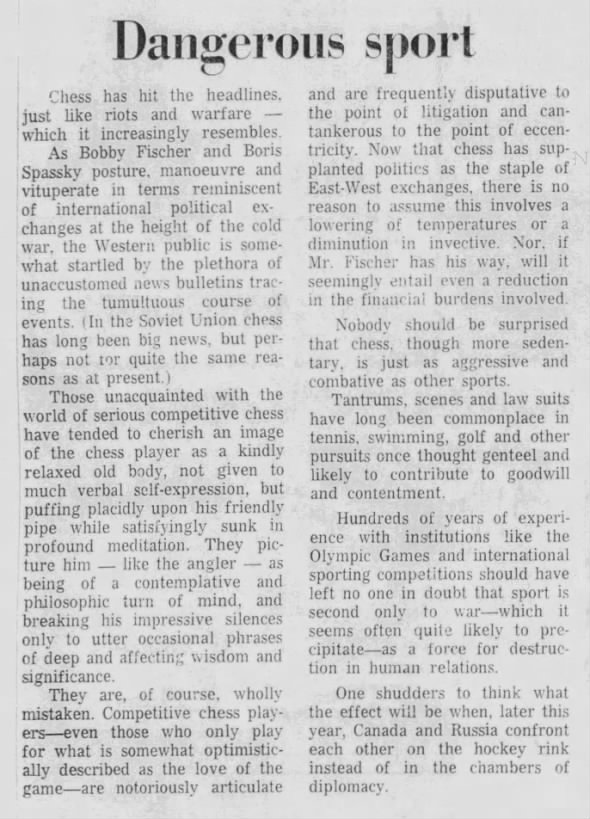 Dangerous Sport 05 Jul 1972, Wed Edmonton Journal (Edmonton, Alberta, Canada) Newspapers.com
Dangerous Sport 05 Jul 1972, Wed Edmonton Journal (Edmonton, Alberta, Canada) Newspapers.com
The Post-Star Glens Falls, New York Wednesday, July 05, 1972 - Page 1
Chess Match Off Until Thursday
New York (AP)—The director of the U.S. Chess Federation said Tuesday if either Bobby Fischer or Boris Spassky fails to show up for their world championship match in Reykjavik, Iceland, Thursday the title should go to the other by default.
And if neither shows up, said Col. E.B. Edmondson, “the title should be declared vacant and they should start all over.”
Edmondson said he was expressing his opinion not as executive director of the U.S. federation but as a member of the five-man advisory board of FIDE, the international chess federation.
Edmondson delivered his opinion after Spassky, the Russian champion and current world title holder, walked out on the scheduled start of the world championship match Tuesday. The match already had been delayed since Sunday by Fischer's early failure to go to Reykjavik in a holdout for more money.
Spassky said his walkout was to protest failure of the international federation to punish Fischer for violations of its rules.
Edmondson said he believed that Spassky “never would have refused to play today of his own volition,” adding that “it's quite obvious they (the Soviets) don't want the match to occur.”
“But regardless of the motives of the two players,” he added, “This has gone far enough. You cannot go on with this kind of charade.”
Asked what he meant by starting all over if both players failed to appear Thursday, Edmondson said details would have to be worked out by the international federation.
Hattiesburg American Hattiesburg, Mississippi Wednesday, July 05, 1972 - Page 8
Fischer, Spassky Chess Match to Start Thursday
Reykjavik, Iceland (AP) — The world championship chess match between Bobby Fischer and Boris Spassky now is scheduled to start Thursday afternoon following another postponement, this one demanded by the Soviet champion.
After holding out for more money and getting it, the American challenger came to Iceland for the postponed opening match Tuesday. But Spassky walked out of the noon drawing to decide who would move first because Fischer was not present. He had sent his second, a Roman Catholic priest.
Officials announced a new 48-hour postponement of the opener, originally scheduled for last Sunday. They hoped both players would be ready to meet on Thursday.
Fischer arrived in Reykjavik early Tuesday. The Icelandic Chess Federation had rejected his demand for 30 per cent of the gate receipts, but he agreed to come after a London investment banker doubled the $125,000 purse which he and Spassky will divide.
The 29-year-old American grandmaster was resting from the overnight flight in a guarded villa at the edge of town when Spassky counterattacked in the holdout department.
The 35-year-old Soviet champion read a prepared statement calling the American's conduct insulting and intolerable. It said Fischer, by refusing to appear at the opening ceremony last weekend, had insulted Spassky personally and the Soviet Chess Federation and had jeopardized his right to play for the title. The statement demanded that Fischer be punished.
However, Max Euwe, president of the international federation, said the Soviets had not formally requested punishment. “What should I do?” he asked. “Put him in the corner?”
Fischer was staying away form newsmen and did not comment on the Soviet statement.
With the contribution from the London Banker, James D. Slater, the winner is to get $156,250 and the loser $93,750. In addition, each player will get another $75,000 from the television and film rights.
Fort Lauderdale News Fort Lauderdale, Florida Wednesday, July 05, 1972 - Page 2
Fischer Chess Match May Not Be Played
Reykjavik (UPI)—The Soviet Chess Federation today demanded that the International Federation (FIDE) rule that Bobby Fischer forfeit the first game in his world chess championship match against Boris Spassky by failing to show up Sunday, FIDE president Dr. Max Euwe said.
Dr. Euwe said “The Soviets did not object Sunday when I postponed the game and now I cannot make such a ruling. If the Soviets insist on this penalty I believe the whole match is off.”
He received the cable from the Soviet Chess Federation in Moscow, demanding that Fischer forfeit the game, shortly after Fischer had broken his silence and regretted that he had been late arriving in Reykjavik.
The Soviet cable referred to paragraph five of the so-called Amsterdam Agreement for the Fischer-Spassky game in which the parties agreed that a player who does not turn up after one hour of the game time has expired forfeits the game and the point to his opponent.
The Soviet decision to break off the talks earlier in the day threw serious doubts on the possibility the match would be played.
“This is a very bad development and I am now very pessimistic about the match,” Euwe said.













